In Focus This Week
New LEO Report Out Today
The 2024 Elections & Voting Information Center Local Election Official Survey Results
Michelle M. Shafer, EVIC Senior Communications Advisor
Local Election Officials (LEOs) are “stewards of democracy” who are positioned at the frontline of elections in the United States. They 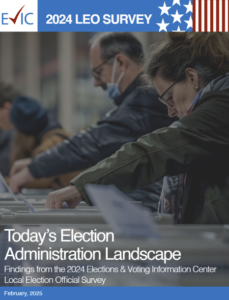 ensure fair, free, accessible, and secure elections. LEOs skillfully manage the new obstacles that come with each election while enduring challenges from political forces, local finance and budget changes, and shifting state election policy. As stewards of democracy, our nation’s LEOs continue to serve voters with dedication. However, they continue to face many challenges.
ensure fair, free, accessible, and secure elections. LEOs skillfully manage the new obstacles that come with each election while enduring challenges from political forces, local finance and budget changes, and shifting state election policy. As stewards of democracy, our nation’s LEOs continue to serve voters with dedication. However, they continue to face many challenges.
In 2024, EVIC’s research team heard from over 650 LEOs nationwide; we thank each of them for responding to the survey and we thank all LEOs for their dedicated service to democracy.
The annual Elections & Voting Information Center (EVIC) LEO Survey, conducted since 2018 by co-research leads EVIC Founder and Director Paul Gronke, PhD, (Reed College) and EVIC Research Director Paul Manson, PhD, (Center for Public Service at Portland State University), captures the challenges and successes facing election officials each year.
EVIC’s 2024 report begins with the challenges LEOs face themselves, including job satisfaction and experience with threats and harassment. The next section describes the policy and organizational challenges offices confront, including hiring staff and funding operations. Finally, the report concludes with LEOs’ perspectives on the performance of US elections and their role in voter education and engagement.
While we encourage you to read the full report, as well as the associated crosstabs, codebooks, and instrument – we want to share a few noteworthy pieces of information here in electionline Weekly.
So who are the LEOs anyway?
As consumers of EVIC’s previous surveys dating back to 2018 know, the typical LEO is a mid-50s woman earning just over $50,000 annually.
Through the 2024 EVIC LEO Survey we learned the following about LEOs:
- 40% of LEOs are eligible for retirement by 2028, raising concerns about succession planning.
- Only 32% of offices have a succession plan in place.
- Despite the turnover, the average experience remains strong, with LEOs bringing 7 years of experience in their current role and 11 years overall in election administration.
Below is a newly-created graphic that shows who LEOs are, noting their relative demographic consistency over time.
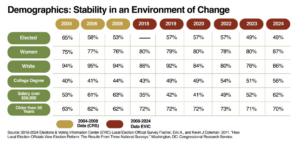
How are LEOs doing?
LEO job satisfaction has stabilized at 77% after declining from 91% in 2022. Job satisfaction is highest among those serving the largest jurisdictions. Increasing workloads, ongoing threats and harassment, and shifting policy requirements are continuing concerns.
EVIC’s key job satisfaction findings from the 2024 LEO Survey include the following:
- Overall, 77% of local election officials are satisfied with their jobs.
- Overwhelmingly, LEOs share a sense of empowerment and confidence in their work.
- Job satisfaction has dropped 20 percentage points since the 2020 election and has not shown much sign of recovery.
- Key measures of aspects of job satisfaction show more significant declines.
- Following the 2020 election, the percentage of LEOs who would recommend that a child pursue election work dropped in half, from 40% to 20%.
- “Respect from Other County Officials” shows a positive return to 2020 levels.
The following three infographics represent EVIC’s key job satisfaction findings through the 2024 EVIC LEO Survey.
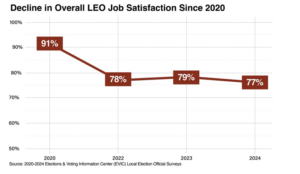
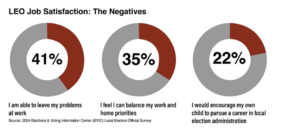
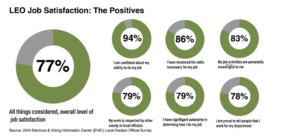
This really just scratches at the surface! There is a whole lot more in the full report – Today’s Election Administration Landscape: Findings from the 2024 Elections & Voting Information Center Local Election Official Survey – so download your copy of the report – along with the codebook, crosstabs and instrument now on our website here: https://evic.reed.edu/leo_survey_project/.
And if you missed it last week, check out Jessica Huseman’s article on the Survey for Votebeat: “Job satisfaction among election administrators continues to sink, survey shows: The survey by the Elections & Voting Information Center, released exclusively to Votebeat, shows that most election administrators would not recommend the job to their own child.”
The 2024 EVIC LEO Survey has been conducted by EVIC in conjunction with Portland State University. Democracy Fund and the Election Trust Initiative generously supported the 2024 LEO Survey Project. This year, our survey also included four research teams, comprised of researchers from California State University, Fresno, University of Missouri-St. Louis, University of Florida, and Election Reformers Network. These researchers participated with a series of questions that will be released by their individual teams at a later date, so be on the lookout for more on this work.
Please reach out to me (shaferm@reed.edu or michelle@magentasage.com) or our EVIC team (evic@reed.edu) with any questions or opportunities for our research team to discuss our findings in more detail. We appreciate the service of all LEOs across the US and their dedication to serving voters and assuring free, fair, equitable, and efficient elections!
electionline Daily News Email
 What’s the best part of waking up? electionline Daily News in your inbox of course so be sure to sign up for your daily dose.
What’s the best part of waking up? electionline Daily News in your inbox of course so be sure to sign up for your daily dose.
Each morning you’ll receive the top headlines of the day, plus a listing of states featured in that day’s news round up.
To sign up, simply visit our site and provide us with your email and you’ll begin receiving the news in your inbox each morning.
We Google so you don’t have to!
Election News This Week
 Citizenship: While state and federal legislators are considering a number of bills that would require voters to prove their citizenship upon registering to vote–instead of just affirming that they are citizens, which is currently the norm – one state, Arizona, is showing why that’s easier said than done. Votebeat has a couple of articles this week of the results of an audit ordered by Gov. Katie Hobbs (D) that shows Arizona’s errors tracking voter citizenship over the last 20 years stemmed from policy decisions made by the Motor Vehicle Division on how to classify driver’s licenses, along with a design error in the state’s voter registration system. The report laid out for the first time the extent of the state’s problem with tracking voter citizenship. And it confirmed, as Votebeat found in October, that it didn’t simply stem from a glitch in the coding of the system, as officials initially announced. Hobbs ordered the comprehensive review of state policies in September after officials found that a problem with the system allowed more than 200,000 voters to be registered to vote full ballots, even though they had never been asked to provide proof of citizenship. In Arizona, only people who have provided citizenship proof can vote in state and local elections. Hobbs recruited two former recorders, Patty Hansen of Coconino County and Robyn Stallworth-Pouquette of Yuma County, to review MVD policies and practices relevant to voter registration. The two reported their findings to the MVD, which compiled the report. The report included three main findings: First, the report found a loophole in state law involving people born in American Samoa and Swains Islands who have not become naturalized citizens. A second finding was that the Secretary of State’s Office and Motor Vehicle Division must communicate better. The last recommendation from the former recorders involves ensuring that inactive MVD records have updated citizenship statuses. Officials in the state’s 15 counties are still struggling to come up with how to best ensure that the 200,000 voters without citizenship proof can provide that proof. According to Votebeat, while Secretary of State Adrian Fontes (D) recently sent the officials the final voter list and provided a few options on how to move forward, he ultimately declined to offer the kind of uniform guidance counties wanted.
Citizenship: While state and federal legislators are considering a number of bills that would require voters to prove their citizenship upon registering to vote–instead of just affirming that they are citizens, which is currently the norm – one state, Arizona, is showing why that’s easier said than done. Votebeat has a couple of articles this week of the results of an audit ordered by Gov. Katie Hobbs (D) that shows Arizona’s errors tracking voter citizenship over the last 20 years stemmed from policy decisions made by the Motor Vehicle Division on how to classify driver’s licenses, along with a design error in the state’s voter registration system. The report laid out for the first time the extent of the state’s problem with tracking voter citizenship. And it confirmed, as Votebeat found in October, that it didn’t simply stem from a glitch in the coding of the system, as officials initially announced. Hobbs ordered the comprehensive review of state policies in September after officials found that a problem with the system allowed more than 200,000 voters to be registered to vote full ballots, even though they had never been asked to provide proof of citizenship. In Arizona, only people who have provided citizenship proof can vote in state and local elections. Hobbs recruited two former recorders, Patty Hansen of Coconino County and Robyn Stallworth-Pouquette of Yuma County, to review MVD policies and practices relevant to voter registration. The two reported their findings to the MVD, which compiled the report. The report included three main findings: First, the report found a loophole in state law involving people born in American Samoa and Swains Islands who have not become naturalized citizens. A second finding was that the Secretary of State’s Office and Motor Vehicle Division must communicate better. The last recommendation from the former recorders involves ensuring that inactive MVD records have updated citizenship statuses. Officials in the state’s 15 counties are still struggling to come up with how to best ensure that the 200,000 voters without citizenship proof can provide that proof. According to Votebeat, while Secretary of State Adrian Fontes (D) recently sent the officials the final voter list and provided a few options on how to move forward, he ultimately declined to offer the kind of uniform guidance counties wanted.
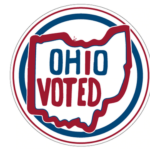 More Transparency: This week, Ohio Secretary of State Frank LaRose (R) announced that every Ohioan can now easily access daily voter registration data through a new online portal, marking a significant milestone in implementing the state’s DATA Act. The portal, available at OhioSoS.gov/Data, provides daily updates of voter registration changes across Ohio’s 88 counties, including new registrations, updates, and removals from voter rolls. Under Ohio law, each board of elections is required to create a prescribed daily record or “daily snapshot” of its voter registration database as of 4 p.m. each day. “While Ohio remains one of only a handful of states with a fully decentralized election administration system, there’s clear value in creating greater uniformity and increased transparency,” said Secretary LaRose. “Transparency earns trust, and I’ll continue to do everything in my power to make Ohio’s elections the most transparent in the nation.” The DATA Act, championed by LaRose and passed in 2023, was the first of its kind in the nation and established the first statewide mandate for uniform definition and retention of election records. The law created the Office of Data Analytics and Archives, which publishes election data for auditing purposes and year-over-year analysis. In addition to the ongoing, robust data hygiene checks conducted by the Ohio Secretary of State’s office and Ohio’s 88 county boards of elections, the public is encouraged to crowdsource the publicly available information and report any discrepancies to the Ohio Secretary of State’s office for prompt investigation and resolution. “Our Office of Data Analytics and Archives has revolutionized Ohio’s ability to be at the cutting edge of election administration,” LaRose added. “On the heels of the smoothest presidential election in Ohio’s history, this new tool will generate an even deeper level of trust in our elections and bolster election integrity in 2025 and beyond.”
More Transparency: This week, Ohio Secretary of State Frank LaRose (R) announced that every Ohioan can now easily access daily voter registration data through a new online portal, marking a significant milestone in implementing the state’s DATA Act. The portal, available at OhioSoS.gov/Data, provides daily updates of voter registration changes across Ohio’s 88 counties, including new registrations, updates, and removals from voter rolls. Under Ohio law, each board of elections is required to create a prescribed daily record or “daily snapshot” of its voter registration database as of 4 p.m. each day. “While Ohio remains one of only a handful of states with a fully decentralized election administration system, there’s clear value in creating greater uniformity and increased transparency,” said Secretary LaRose. “Transparency earns trust, and I’ll continue to do everything in my power to make Ohio’s elections the most transparent in the nation.” The DATA Act, championed by LaRose and passed in 2023, was the first of its kind in the nation and established the first statewide mandate for uniform definition and retention of election records. The law created the Office of Data Analytics and Archives, which publishes election data for auditing purposes and year-over-year analysis. In addition to the ongoing, robust data hygiene checks conducted by the Ohio Secretary of State’s office and Ohio’s 88 county boards of elections, the public is encouraged to crowdsource the publicly available information and report any discrepancies to the Ohio Secretary of State’s office for prompt investigation and resolution. “Our Office of Data Analytics and Archives has revolutionized Ohio’s ability to be at the cutting edge of election administration,” LaRose added. “On the heels of the smoothest presidential election in Ohio’s history, this new tool will generate an even deeper level of trust in our elections and bolster election integrity in 2025 and beyond.”
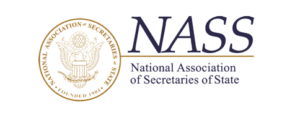 News from NASS: The National Association of Secretaries of State (NASS) presented its 2024 Margaret Chase Smith American Democracy Award for political courage posthumously to Mr. Johnnie Anderson Jones, Sr. Jones organized the Baton Rouge Bus Boycott of 1953 that inspired the later Montgomery Bus Boycotts. During his lifetime, he was dedicated to public service and civil rights through his work as an attorney, member of the Louisiana House of Representatives, and military service for which he earned the Purple Heart and Legion of Honor Award. Jones was nominated for the award by Louisiana Secretary of State Nancy Landry. “Johnnie Jones led a life of extraordinary courage and heroism, and demonstrated an uncommon commitment to democracy, equality, and justice in our country. Whether as a member of the U.S. Army, fighting in Northern France, or back home in Baton Rouge, Mr. Jones consistently showed us what it means to be a patriot. I’m grateful that the NASS membership has seen fit to honor Mr. Jones with this year’s Margaret Chase Smith Award,” said Landry.
News from NASS: The National Association of Secretaries of State (NASS) presented its 2024 Margaret Chase Smith American Democracy Award for political courage posthumously to Mr. Johnnie Anderson Jones, Sr. Jones organized the Baton Rouge Bus Boycott of 1953 that inspired the later Montgomery Bus Boycotts. During his lifetime, he was dedicated to public service and civil rights through his work as an attorney, member of the Louisiana House of Representatives, and military service for which he earned the Purple Heart and Legion of Honor Award. Jones was nominated for the award by Louisiana Secretary of State Nancy Landry. “Johnnie Jones led a life of extraordinary courage and heroism, and demonstrated an uncommon commitment to democracy, equality, and justice in our country. Whether as a member of the U.S. Army, fighting in Northern France, or back home in Baton Rouge, Mr. Jones consistently showed us what it means to be a patriot. I’m grateful that the NASS membership has seen fit to honor Mr. Jones with this year’s Margaret Chase Smith Award,” said Landry.
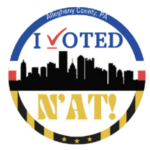 Sticker News: Wooo! We have our first “I Voted” sticker winner of 2025 and yinz are going to be so excited when you see it! The Allegheny County, Pennsylvania Elections Division announced this week that Molly Bozick, a 10th-grader at Mount Lebanon High School, submitted the “I Voted N’at’!” design, which was chosen out of more than three dozen submissions. After Allegheny County staff narrowed it down to 10 finalists, the public was invited to vote for the winning sticker where more than 13,000 votes were cast. “I Voted N’At!” received 2,410 to win the competition. The new sticker will make its Election Day debut at the May 20 primary and be used for elections in Allegheny County through 2025 and 2026. “I’m so honored to have my sticker chosen and can’t wait to see it in print,” said Bozick. “When crafting my design, I focused on creating a balance between our civic duty and Pittsburgh pride. ‘I Voted N’at’ really captures the spirit of both.” “I’m so excited for yinz to get dahn to the polls this primary day to see this new yinzer-made sticker,” said Board of Election Member and County Councilmember Bethany Hallam. “We had so many unique designs submitted from bison to bridges n’at.”
Sticker News: Wooo! We have our first “I Voted” sticker winner of 2025 and yinz are going to be so excited when you see it! The Allegheny County, Pennsylvania Elections Division announced this week that Molly Bozick, a 10th-grader at Mount Lebanon High School, submitted the “I Voted N’at’!” design, which was chosen out of more than three dozen submissions. After Allegheny County staff narrowed it down to 10 finalists, the public was invited to vote for the winning sticker where more than 13,000 votes were cast. “I Voted N’At!” received 2,410 to win the competition. The new sticker will make its Election Day debut at the May 20 primary and be used for elections in Allegheny County through 2025 and 2026. “I’m so honored to have my sticker chosen and can’t wait to see it in print,” said Bozick. “When crafting my design, I focused on creating a balance between our civic duty and Pittsburgh pride. ‘I Voted N’at’ really captures the spirit of both.” “I’m so excited for yinz to get dahn to the polls this primary day to see this new yinzer-made sticker,” said Board of Election Member and County Councilmember Bethany Hallam. “We had so many unique designs submitted from bison to bridges n’at.”
Personnel News: Curtis Lily has resigned from the Waynesboro, Virginia board of elections. Issac Overstreet is the new Stephens County, Georgia elections supervisor. Megan Page has been appointed the new Pettis County, Missouri clerk. Leann Angerman is stepping down as the assistant director of the Lake County, Indiana board of elections. Elizabeth Ann Delmas has been hired as an elections investigator with the Georgia State Board of Elections. Robbins Cherry has been hired as the Perquimans County, North Carolina Board of Elections deputy director. Republican Treasurer Robert Sprague announced his candidacy for Ohio Secretary of State in 2026.
New Research and Resources
 Election Administration Grants: The U.S. Election Assistance Commission (EAC) was created by Congress in 2002 to improve the administration of elections for federal offices through funding, guidance, and policy development under the Help America Vote Act of 2002 (HAVA). Through HAVA, Congress provides funding to state and local election jurisdictions to enhance their operations. Since 2018, the EAC has disbursed over $1 billion in Election Security Grants, constituting one-fifth of all federal spending on election administration to date. This report represents the first comprehensive effort to categorize and catalog the impact of federal election funding since 2018. As of August 2024, states reported spending over $638 million (approximately 63%) of the more than $1 billion in appropriated Election Security funds. Of the remaining funds to be spent, the vast majority (more than 98%) has been budgeted for planned activities. States have spent approximately $343 million (about 56% of the Election Security funds that have been spent) on voting equipment and cyber security—expenditures that are necessary to keep elections safe, secure, and trustworthy. To understand how funding has been deployed thus far, the Bipartisan Policy Center gathered and analyzed grant reports, program narratives, and other documents provided by states as part of the reporting process for federal Election Security Grants. BPC also conducted interviews with and reviewed additional materials from state and local election officials to provide a holistic assessment of the effects of Election Security Grants on election administration and the voting experience.
Election Administration Grants: The U.S. Election Assistance Commission (EAC) was created by Congress in 2002 to improve the administration of elections for federal offices through funding, guidance, and policy development under the Help America Vote Act of 2002 (HAVA). Through HAVA, Congress provides funding to state and local election jurisdictions to enhance their operations. Since 2018, the EAC has disbursed over $1 billion in Election Security Grants, constituting one-fifth of all federal spending on election administration to date. This report represents the first comprehensive effort to categorize and catalog the impact of federal election funding since 2018. As of August 2024, states reported spending over $638 million (approximately 63%) of the more than $1 billion in appropriated Election Security funds. Of the remaining funds to be spent, the vast majority (more than 98%) has been budgeted for planned activities. States have spent approximately $343 million (about 56% of the Election Security funds that have been spent) on voting equipment and cyber security—expenditures that are necessary to keep elections safe, secure, and trustworthy. To understand how funding has been deployed thus far, the Bipartisan Policy Center gathered and analyzed grant reports, program narratives, and other documents provided by states as part of the reporting process for federal Election Security Grants. BPC also conducted interviews with and reviewed additional materials from state and local election officials to provide a holistic assessment of the effects of Election Security Grants on election administration and the voting experience.
 Ballot Initiative Process: A new report from the Election Reformers Network (ERN) shows how state legislatures and elected officials have manipulated the ballot initiative process to stymie the will of voters in many states across the country. The report, Partisan Control of Ballot Measures: How to Stop Manipulation of Citizen Initiatives, was released this week. From 2010 to 2023, state legislatures amended or repealed more than 20% of voter-approved initiatives. In addition, partisan officials,such as secretaries of state and attorney generals, have used their control of ballot language, fiscal assessments, and signature verification to mislead voters or block measures from reaching voters. And, the report finds, the controversial actions are growing increasingly blatant. “The problem is clear. States that have given voters the right to advance ballot initiatives need to protect that right against abuses by elected officials,” said ERN Executive Director Kevin Johnson. “The will of the majority has been thwarted many times in many states. For voters, these abuses seem to prove the system is rigged against them. For politicians and political parties, win-at-all-costs is the new and dangerous imperative.” Abuses have occurred in blue states and red. One of the most egregious examples occurred this year in Ohio, where Issue 1 proposed an independent redistricting commission. Secretary of State Frank LaRose used his control of the state ballot board to write a title and summary that completely misled voters. For a measure intended to “ban partisan gerrymandering,” LaRose’s approved language described a commission “required to gerrymander.”
Ballot Initiative Process: A new report from the Election Reformers Network (ERN) shows how state legislatures and elected officials have manipulated the ballot initiative process to stymie the will of voters in many states across the country. The report, Partisan Control of Ballot Measures: How to Stop Manipulation of Citizen Initiatives, was released this week. From 2010 to 2023, state legislatures amended or repealed more than 20% of voter-approved initiatives. In addition, partisan officials,such as secretaries of state and attorney generals, have used their control of ballot language, fiscal assessments, and signature verification to mislead voters or block measures from reaching voters. And, the report finds, the controversial actions are growing increasingly blatant. “The problem is clear. States that have given voters the right to advance ballot initiatives need to protect that right against abuses by elected officials,” said ERN Executive Director Kevin Johnson. “The will of the majority has been thwarted many times in many states. For voters, these abuses seem to prove the system is rigged against them. For politicians and political parties, win-at-all-costs is the new and dangerous imperative.” Abuses have occurred in blue states and red. One of the most egregious examples occurred this year in Ohio, where Issue 1 proposed an independent redistricting commission. Secretary of State Frank LaRose used his control of the state ballot board to write a title and summary that completely misled voters. For a measure intended to “ban partisan gerrymandering,” LaRose’s approved language described a commission “required to gerrymander.”
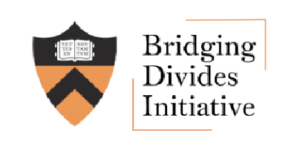 Political Violence Trends: Last year was marked by significant incidents of political violence and hostility in the U.S. As we enter the new year, the risk of political violence continues to pose a serious danger. Identifying shifts in the risk environment over the course of 2024–and lessons learned from the resilience strategies employed by local officials, civil society organizations and community leaders to push back — will be critical for efforts to counter these threats in 2025. Drawing on the past year of data collection and real-time monitoring conducted by the Bridgine Divides Initiative and their partners, this special report outlines 5 key political violence trends that emerged in 2024, assesses how these risk factors are likely to evolve in 2025, and elevates 3 models of effective preparation and response that can inform mitigation work for the coming months.
Political Violence Trends: Last year was marked by significant incidents of political violence and hostility in the U.S. As we enter the new year, the risk of political violence continues to pose a serious danger. Identifying shifts in the risk environment over the course of 2024–and lessons learned from the resilience strategies employed by local officials, civil society organizations and community leaders to push back — will be critical for efforts to counter these threats in 2025. Drawing on the past year of data collection and real-time monitoring conducted by the Bridgine Divides Initiative and their partners, this special report outlines 5 key political violence trends that emerged in 2024, assesses how these risk factors are likely to evolve in 2025, and elevates 3 models of effective preparation and response that can inform mitigation work for the coming months.
Ballot Measures, Legislation & Rulemaking
 Arkansas: Following the 2024 elections, Representative of District 73 in the State House, Andrew Collins, pre-filed H.B. 1035, a bill to create the Online Voter Registration Act of 2025. The online system would allow eligible Arkansans to register or update their existing voter registration electronically. Additionally, the legislation mandates the provision of electronic signatures for security purposes. In the 2024 general elections last November, Arkansas ranked 48th in the country for voter turnout, with 53.5 percent.
Arkansas: Following the 2024 elections, Representative of District 73 in the State House, Andrew Collins, pre-filed H.B. 1035, a bill to create the Online Voter Registration Act of 2025. The online system would allow eligible Arkansans to register or update their existing voter registration electronically. Additionally, the legislation mandates the provision of electronic signatures for security purposes. In the 2024 general elections last November, Arkansas ranked 48th in the country for voter turnout, with 53.5 percent.
The House Committee on State Agencies and Governmental Affairs advanced three election-related bills this week. Rep. David Ray, a Maumelle Republican and sponsor of all three bills, said House Bill 1221 would clarify that the certification of ballot titles for initiatives, referenda and constitutional amendments as well as the signatures collected for those measures would only be valid for the next general election. This is not a significant change and codifies a long-standing practice, Ray said. After the committee approved HB 1221 on a split voice vote, members next considered another bill from Ray, who said he doesn’t believe the current process for reviewing proposed ballot measures is strong enough to protect voters from problematic ballot language. Currently, Arkansas’ attorney general can deem a proposed ballot measure insufficient for issues like a misleading title or confusing language. House Bill 1222 would expand the AG’s authority to reject a proposal if it conflicts with the U.S. Constitution or federal statutes. Additionally, HB 1222 would prevent a sponsor from submitting more than one conflicting petition at the same time, which Ray said “closes an egregious loophole in the process that led to abuse of this process last session.” The final and least controversial of Ray’s proposals considered by the committee was House Bill 1223, which would allow a candidate for the Arkansas Supreme Court or the Court of Appeals who is currently serving in that position as an appointee to use that position as a prefix on the ballot. The measure passed with no discussion on a unanimous voice vote. All three bills will next be considered by the full House.
 Idaho: Lawmakers introduced a bill to block voter registration processing for people whose citizenship status isn’t confirmed. House Bill 94, brought by Idaho House Majority Caucus Chair Jaron Crane, R-Nampa, says the Idaho Secretary of State would verify citizenship statuses of everyone on Idaho’s statewide voter registration list by referencing their voter registration info with citizenship data from other datasets, including by the Idaho Transportation Department, the Social Security Administration’s “Help America Vote Information System,” and other, unnamed datasets containing citizenship status. In November, Idaho voters overwhelmingly approved a constitutional amendment — proposed by the Idaho Legislature — to explicitly ban noncitizens from voting in elections. “Any registrant in the statewide voter registration list whose status as a United States citizen cannot be confirmed from a comparison with” one or more databases “shall be removed from the list of eligible voters,” the bill says. “The individual voter shall be notified in writing of the inability of the secretary of state to confirm the individual’s citizenship status and shall be provided the opportunity to present evidence or documentary proof of citizenship to be restored to the eligible voter list,” the bill says. Secretary of State Phil McGrane told the Idaho Capitol Sun that he was planning to bring a bill focused on voter roll maintenance that he believes is more broad and includes the Secretary of State’s Office’s noncitizen voter review efforts last year. “I think there’s more tools that we use than may be covered in the bill, so we’ll be talking with him to figure out … what we move forward,” McGrane told the Sun. “And, you know, my sense is the bill that we’ve been working on will probably be the best solution for the state. Crane’s new bill appears to address public elections specifically. “It is unlawful for any individual who is not a citizen of the United States to vote in any and all public elections on any and all matters,” the new bill states. “This includes but is not limited to any primary election, general election, election for federal office, election for state office, election for local office, and any public election that includes voting on constitutional amendments, ballot initiatives, or referenda.” If passed into law, “willful violation” of the bill’s provision on noncitizens not voting would be a crime of attempting to vote when not qualified, the bill says. That references a crime already outlined in Idaho election law. The House State Affairs Committee introduced Crane’s bill on a unanimous voice vote.
Idaho: Lawmakers introduced a bill to block voter registration processing for people whose citizenship status isn’t confirmed. House Bill 94, brought by Idaho House Majority Caucus Chair Jaron Crane, R-Nampa, says the Idaho Secretary of State would verify citizenship statuses of everyone on Idaho’s statewide voter registration list by referencing their voter registration info with citizenship data from other datasets, including by the Idaho Transportation Department, the Social Security Administration’s “Help America Vote Information System,” and other, unnamed datasets containing citizenship status. In November, Idaho voters overwhelmingly approved a constitutional amendment — proposed by the Idaho Legislature — to explicitly ban noncitizens from voting in elections. “Any registrant in the statewide voter registration list whose status as a United States citizen cannot be confirmed from a comparison with” one or more databases “shall be removed from the list of eligible voters,” the bill says. “The individual voter shall be notified in writing of the inability of the secretary of state to confirm the individual’s citizenship status and shall be provided the opportunity to present evidence or documentary proof of citizenship to be restored to the eligible voter list,” the bill says. Secretary of State Phil McGrane told the Idaho Capitol Sun that he was planning to bring a bill focused on voter roll maintenance that he believes is more broad and includes the Secretary of State’s Office’s noncitizen voter review efforts last year. “I think there’s more tools that we use than may be covered in the bill, so we’ll be talking with him to figure out … what we move forward,” McGrane told the Sun. “And, you know, my sense is the bill that we’ve been working on will probably be the best solution for the state. Crane’s new bill appears to address public elections specifically. “It is unlawful for any individual who is not a citizen of the United States to vote in any and all public elections on any and all matters,” the new bill states. “This includes but is not limited to any primary election, general election, election for federal office, election for state office, election for local office, and any public election that includes voting on constitutional amendments, ballot initiatives, or referenda.” If passed into law, “willful violation” of the bill’s provision on noncitizens not voting would be a crime of attempting to vote when not qualified, the bill says. That references a crime already outlined in Idaho election law. The House State Affairs Committee introduced Crane’s bill on a unanimous voice vote.
Rep. Joe Alfieri, R-Coeur d’Alene introduced a bill intended to limit who can receive an absentee ballot. Alfieri told the Idaho House State Affairs Committee the bill’s purpose is to prevent fraud. According to the bill’s statement of purpose, the absentee ballot was “never intended as a convenience,” and it was meant to provide access to voters with a physical infirmity, an illness and those with work restrictions. Currently, any registered voter in Idaho may request an absentee ballot to be mailed to their address. But the bill would change this policy, allowing only the following Idahoans to request an absentee ballot: Those on active military service; Those experiencing an illness, disability or hospitalization; Those working or attending university; Those on a religious mission; Those occupying a second home or residents outside of their home county on the day of the election; Those 65 years old or older and; Those living in a mail ballot precinct Idaho legislators have introduced similar bills in the past, the Idaho Capital Sun previously reported, but they did not make it past the early stages of the Idaho House side.
 Indiana: In a 6-3 vote, the Senate Elections Committee approved a bill that would curtail Indiana’s early in-person voting timeline. Under current law, voters can cast ballots in person for 28 days ahead of elections. After an amendment, Senate Bill 284 would reduce that period to 14 days. It originally would’ve cut the period to just seven days. Clerks have complained it’s too hard to staff early voting centers for so long, particularly when so few Hoosiers vote during the first half of the period compared to the second half, Author Sen. Gary Byrne, R-Byrnesville, told the Senate’s Elections Committee. Before the committee’s vote, he called his proposal “common-sense” and said voting was easier now than when his ancestors had to drive a horse and buggy miles to vote. Multiple witnesses, however, feared the change could worsen already-long early voting lines or drop already-low turnout. Indiana’s voter participation rate has historically been among the nation’s lowest. “Hoosier voters like early in-person voting, and certainly in central Indiana, early voting is busy from the first day to the last day — so busy that people are waiting in line (for) two, three hours at early voting locations in Marion and in Hamilton counties,” said Julia Vaughn, leader of elections watchdog Common Cause Indiana. “We don’t need less early voting in Indiana. We need more of it.” She noted that elderly and disabled voters already struggle to stand in line for so long.
Indiana: In a 6-3 vote, the Senate Elections Committee approved a bill that would curtail Indiana’s early in-person voting timeline. Under current law, voters can cast ballots in person for 28 days ahead of elections. After an amendment, Senate Bill 284 would reduce that period to 14 days. It originally would’ve cut the period to just seven days. Clerks have complained it’s too hard to staff early voting centers for so long, particularly when so few Hoosiers vote during the first half of the period compared to the second half, Author Sen. Gary Byrne, R-Byrnesville, told the Senate’s Elections Committee. Before the committee’s vote, he called his proposal “common-sense” and said voting was easier now than when his ancestors had to drive a horse and buggy miles to vote. Multiple witnesses, however, feared the change could worsen already-long early voting lines or drop already-low turnout. Indiana’s voter participation rate has historically been among the nation’s lowest. “Hoosier voters like early in-person voting, and certainly in central Indiana, early voting is busy from the first day to the last day — so busy that people are waiting in line (for) two, three hours at early voting locations in Marion and in Hamilton counties,” said Julia Vaughn, leader of elections watchdog Common Cause Indiana. “We don’t need less early voting in Indiana. We need more of it.” She noted that elderly and disabled voters already struggle to stand in line for so long.
The committee also approved legislation that would alter primary voting. Voters currently can ask for either a Democratic or Republican Party ballot while voting in a primary election. There’s no need to “register” with a party to do so. Senate Bill 201, approved in a 7-2 vote, would end that. It would add new text to voter registration forms: “Would you like to choose your political party? If you wish to vote in a primary election, you must first choose your political party affiliation and may only vote that party’s ballot in the primary election.” Sen. Mike Gaskill, R-Pendleton, said there’s “concern in several areas of the state that people are voting in the primary (for a) party that they don’t really intellectually identify with.” He authored the bill and chairs the committee. Gaskill’s legislation would also require county voter registration offices to affiliate every registered voter with either the Democratic or Republican Party based on their last primary election vote. A voter would be able to change parties at any time by using a new voter affiliation form — except for a “blackout period” 119 days before a primary election.
 Maine: Republican lawmakers proposed eliminating the state’s voter-approved ranked-choice voting system as well as adding an amendment to explicitly ban noncitizen voting, which is already illegal under the state constitution. The Legislature’s Veterans and Legal Affairs Committee heard testimony this week on these plans and other proposals to change state voting laws, including candidate communications at the polls and absentee voting. LD 234 would repeal all current laws that permit this voting system in the state, which includes general elections for president, general and special elections for the offices of U.S. Senate and House, and primary elections for president, U.S. Senate and House, the governor and state legislators. LD 175 would ban noncitizens from voting. LD 199 would allow a candidate to tell voters at the polls what office they are seeking and their party designation, “as long as the candidate does not attempt to influence their vote.” LD 158 would direct the secretary of state to establish a date each year for the start of absentee voting. Such a change would not impact regulations for overseas or military ballots.
Maine: Republican lawmakers proposed eliminating the state’s voter-approved ranked-choice voting system as well as adding an amendment to explicitly ban noncitizen voting, which is already illegal under the state constitution. The Legislature’s Veterans and Legal Affairs Committee heard testimony this week on these plans and other proposals to change state voting laws, including candidate communications at the polls and absentee voting. LD 234 would repeal all current laws that permit this voting system in the state, which includes general elections for president, general and special elections for the offices of U.S. Senate and House, and primary elections for president, U.S. Senate and House, the governor and state legislators. LD 175 would ban noncitizens from voting. LD 199 would allow a candidate to tell voters at the polls what office they are seeking and their party designation, “as long as the candidate does not attempt to influence their vote.” LD 158 would direct the secretary of state to establish a date each year for the start of absentee voting. Such a change would not impact regulations for overseas or military ballots.
 Michigan: A new proposal seeks to require would-be voters to provide proof that they are U.S. citizens when they register. The proposal to amend the state constitution isn’t likely to pass the Legislature with required two-thirds support, but conservatives are already gearing up for a petition drive to try to put the proposal before voters on the 2026 ballot. The proposed amendment is the latest in a growing movement across the United States to create barriers to noncitizen voting, even though there’s little evidence that a significant number of noncitizens try to vote. Federal laws already ban noncitizens from voting in elections, and the risks for them are high, including felony charges and the loss of their residency status. The House joint resolution from Rep. Bryan Posthumus, a Republican from Rockford and the House majority floor leader, would require anyone who registers to vote starting on Dec. 18, 2026, to verify that they are U.S. citizens. Voters who register without that documentation may present those documents later to their community election officials or the secretary of state’s office. Those who have not confirmed their citizenship in time for the election would be required to cast a provisional ballot, which would only be counted if their citizenship is verified within six days after an election. But the bill would go beyond just newly registering voters. It would require the state to “use an ongoing systematic process” to continually affirm that the people in the qualified voter file — the state’s record of everyone registered to vote — are U.S. citizens. That means retroactive verification for the more than 8 million people on Michigan’s rolls. Those who are identified as noncitizens would be notified within a week and then have 60 days to verify their citizenship or be removed from the rolls. Citizenship can be verified with a state ID or the last four digits of a person’s Social Security number, according to the text of the joint amendment, which more than 40 other Republicans signed on to. The state must then “use all reasonable efforts” to verify citizenship, which can include checking with the federal government.
Michigan: A new proposal seeks to require would-be voters to provide proof that they are U.S. citizens when they register. The proposal to amend the state constitution isn’t likely to pass the Legislature with required two-thirds support, but conservatives are already gearing up for a petition drive to try to put the proposal before voters on the 2026 ballot. The proposed amendment is the latest in a growing movement across the United States to create barriers to noncitizen voting, even though there’s little evidence that a significant number of noncitizens try to vote. Federal laws already ban noncitizens from voting in elections, and the risks for them are high, including felony charges and the loss of their residency status. The House joint resolution from Rep. Bryan Posthumus, a Republican from Rockford and the House majority floor leader, would require anyone who registers to vote starting on Dec. 18, 2026, to verify that they are U.S. citizens. Voters who register without that documentation may present those documents later to their community election officials or the secretary of state’s office. Those who have not confirmed their citizenship in time for the election would be required to cast a provisional ballot, which would only be counted if their citizenship is verified within six days after an election. But the bill would go beyond just newly registering voters. It would require the state to “use an ongoing systematic process” to continually affirm that the people in the qualified voter file — the state’s record of everyone registered to vote — are U.S. citizens. That means retroactive verification for the more than 8 million people on Michigan’s rolls. Those who are identified as noncitizens would be notified within a week and then have 60 days to verify their citizenship or be removed from the rolls. Citizenship can be verified with a state ID or the last four digits of a person’s Social Security number, according to the text of the joint amendment, which more than 40 other Republicans signed on to. The state must then “use all reasonable efforts” to verify citizenship, which can include checking with the federal government.
 Mississippi: Two measures allowing some people convicted of disenfranchising felony offenses to regain their voting rights passed a House committee on Tuesday, allowing the House to consider reforming one of the most strict felony disenfranchisement systems in the nation. The House Constitution Committee passed a measure to amend the state Constitution to revise the list of crimes that would result in someone losing their right to vote for life. Rep. Price Wallace, a Republican from Mendenhall who leads the committee, told reporters that his focus is establishing a pathway for people previously convicted of nonviolent offenses, especially those who have not committed any other offense, to regain their voting rights. The constitutional amendment removes bribery, theft, obtaining money or goods under false pretenses, perjury, forgery and bigamy from the list of disenfranchising crimes. It adds human trafficking, sexual battery, child exploitation or commercial sexual activity. The list of crimes already includes murder, arson, rape and embezzlement. It can now go before the full House for consideration, where two-thirds of its members must approve it before it can go to the Senate for further debate. The House committee also passed a bill clarifying that if someone has a non-violent felony conviction that is also a disenfranchising crime, that offense could be expunged from their record, meaning it would be erased.
Mississippi: Two measures allowing some people convicted of disenfranchising felony offenses to regain their voting rights passed a House committee on Tuesday, allowing the House to consider reforming one of the most strict felony disenfranchisement systems in the nation. The House Constitution Committee passed a measure to amend the state Constitution to revise the list of crimes that would result in someone losing their right to vote for life. Rep. Price Wallace, a Republican from Mendenhall who leads the committee, told reporters that his focus is establishing a pathway for people previously convicted of nonviolent offenses, especially those who have not committed any other offense, to regain their voting rights. The constitutional amendment removes bribery, theft, obtaining money or goods under false pretenses, perjury, forgery and bigamy from the list of disenfranchising crimes. It adds human trafficking, sexual battery, child exploitation or commercial sexual activity. The list of crimes already includes murder, arson, rape and embezzlement. It can now go before the full House for consideration, where two-thirds of its members must approve it before it can go to the Senate for further debate. The House committee also passed a bill clarifying that if someone has a non-violent felony conviction that is also a disenfranchising crime, that offense could be expunged from their record, meaning it would be erased.
 Nevada: Senate Bill 103 would require mail-in ballots to be postmarked by the last day of early voting and received by the close of polling on election day to be counted. This aims to expedite election result announcements, which currently extend up to four days post-election. Hoffmann noted that while this bill could streamline results, its popularity in Carson City remains uncertain.
Nevada: Senate Bill 103 would require mail-in ballots to be postmarked by the last day of early voting and received by the close of polling on election day to be counted. This aims to expedite election result announcements, which currently extend up to four days post-election. Hoffmann noted that while this bill could streamline results, its popularity in Carson City remains uncertain.
 New Hampshire: The House Election Law Committee heard testimony this week on a bill that would allow for no-excuse absentee voting. “We need to listen to the people, the vast majority of people in New Hampshire and across the country support no-excuse absentee ballots,” Rep. Connie Lane, D-Concord said. “Let the people decide instead of us deciding what they want.” Secretary of State David Scanlan did not take a position on CACR 5, a proposed constitutional amendment that would allow any registered voter to request an absentee ballot without giving a reason. He noted the constitution has been amended a number of times with absentee voting, but the changes in the past were a matter of necessity such as being out of town or unable to go to the polls because of a disability. “The proposed change goes from a matter of necessity to a matter of convenience,” Scanlan said. “You simply don’t want to get up in the morning and go to the polling place.”
New Hampshire: The House Election Law Committee heard testimony this week on a bill that would allow for no-excuse absentee voting. “We need to listen to the people, the vast majority of people in New Hampshire and across the country support no-excuse absentee ballots,” Rep. Connie Lane, D-Concord said. “Let the people decide instead of us deciding what they want.” Secretary of State David Scanlan did not take a position on CACR 5, a proposed constitutional amendment that would allow any registered voter to request an absentee ballot without giving a reason. He noted the constitution has been amended a number of times with absentee voting, but the changes in the past were a matter of necessity such as being out of town or unable to go to the polls because of a disability. “The proposed change goes from a matter of necessity to a matter of convenience,” Scanlan said. “You simply don’t want to get up in the morning and go to the polling place.”
Lawmakers debate legislation that some say would deal with long lines at some polls during the presidential election. Lawmakers want to ease the gridlock for presidential elections by requiring towns and cities to have a minimum of one polling place for every 20,000 registered voters or to seek a waiver from the secretary of state by filing a plan to make accommodations for a location with more than 20,000. “It’s simply an effort to ensure that voters have an appropriate opportunity to get to the polls and cast their ballots,” said state Sen. Keith Murphy, R-Manchester. Only 11 towns and cities statewide are over that 20,000-voter threshold. The cities are split into wards, and most of the big towns have more than one polling location. Derry does not and is, famously, the largest single polling location in the United States. Town clerk Tina Guilford said the voting process in Derry flows quickly. It’s traffic that causes the lines.
 New Jersey: The Senate Budget and Appropriations Committee advanced legislation this week sponsored by Senator Andrew Zwicker and Senator James Beach that would change various Motor Vehicle Commission (MVC) procedures to provide a new Automatic Voter Registration System (AVR) in New Jersey. “Updating our AVR system has the power to increase voter registration and turnout due to the removal of registration barriers, especially for low-income communities and communities of color,” said Zwicker (D-Middlesex/Mercer/Somerset/Hunterdon). “More voters means a more representative constitutional democracy in New Jersey, allowing more residents the opportunity to shape the State they live in.” Currently, the New Jersey MVC utilizes an AVR system where eligible citizens are given a prompt when performing a license renewal or update asking if they want to register to vote or update their voter registration information. The bill, S-1636, proposes an AVR system that would automatically register an eligible voter when they perform a REAL-ID or nondriver identification card transaction at the MVC, apply for Medicaid, or are scheduled to be released from incarceration. Once the Secretary of State verifies such a person is eligible to vote, a notice would be sent to them which the eligible voter may return for party affiliation purposes or to opt-out from registration. “Not only does this new AVR system increase the number of registered voters, it will also save counties time and money,” said Senator Beach (D-Camden/Burlington). “Updating AVR will reduce the amount of money spent on staff time, paper processing, and mailing, creating a more efficient and accurate Statewide Voter Registration system.” The bill advanced out of committee by a 9-3 vote.
New Jersey: The Senate Budget and Appropriations Committee advanced legislation this week sponsored by Senator Andrew Zwicker and Senator James Beach that would change various Motor Vehicle Commission (MVC) procedures to provide a new Automatic Voter Registration System (AVR) in New Jersey. “Updating our AVR system has the power to increase voter registration and turnout due to the removal of registration barriers, especially for low-income communities and communities of color,” said Zwicker (D-Middlesex/Mercer/Somerset/Hunterdon). “More voters means a more representative constitutional democracy in New Jersey, allowing more residents the opportunity to shape the State they live in.” Currently, the New Jersey MVC utilizes an AVR system where eligible citizens are given a prompt when performing a license renewal or update asking if they want to register to vote or update their voter registration information. The bill, S-1636, proposes an AVR system that would automatically register an eligible voter when they perform a REAL-ID or nondriver identification card transaction at the MVC, apply for Medicaid, or are scheduled to be released from incarceration. Once the Secretary of State verifies such a person is eligible to vote, a notice would be sent to them which the eligible voter may return for party affiliation purposes or to opt-out from registration. “Not only does this new AVR system increase the number of registered voters, it will also save counties time and money,” said Senator Beach (D-Camden/Burlington). “Updating AVR will reduce the amount of money spent on staff time, paper processing, and mailing, creating a more efficient and accurate Statewide Voter Registration system.” The bill advanced out of committee by a 9-3 vote.
 North Carolina: Early voting in North Carolina would be drastically slashed if state lawmakers approve a new bill filed this week by state Rep. Wyatt Gable. Early voting is by far the most popular form of voting in North Carolina. More than 5.7 million people voted in the state’s 2024 general elections, including more than 4.1 million who cast their ballots during early voting. Gable’s bill would ban all Sunday early voting in North Carolina by reducing the early voting period from three weeks to six days, ending on the Saturday before the election. A similar proposal eliminating Sunday voting was part of a wide-ranging elections law Republicans passed in 2013 shortly after taking over control of state government. It was later ruled unconstitutional due to racial discrimination, after evidence emerged in court that lawmakers obtained racial data they then used to write the law that touched on early voting, voter ID and more. The U.S. Court of Appeals for the Fourth Circuit later ruled that Republican legislators used that data to target Black voters “with almost surgical precision.”
North Carolina: Early voting in North Carolina would be drastically slashed if state lawmakers approve a new bill filed this week by state Rep. Wyatt Gable. Early voting is by far the most popular form of voting in North Carolina. More than 5.7 million people voted in the state’s 2024 general elections, including more than 4.1 million who cast their ballots during early voting. Gable’s bill would ban all Sunday early voting in North Carolina by reducing the early voting period from three weeks to six days, ending on the Saturday before the election. A similar proposal eliminating Sunday voting was part of a wide-ranging elections law Republicans passed in 2013 shortly after taking over control of state government. It was later ruled unconstitutional due to racial discrimination, after evidence emerged in court that lawmakers obtained racial data they then used to write the law that touched on early voting, voter ID and more. The U.S. Court of Appeals for the Fourth Circuit later ruled that Republican legislators used that data to target Black voters “with almost surgical precision.”
 North Dakota: The Legislature recently discussed a bill that would end approval voting for Fargo city elections. The bill is similar to another bill passed last session that was vetoed by then Governor Doug Burgum. If passed, HB 1297 would ban approval voting and ranked choice voting for elected officials in the state. Currently, Fargo is the only city in the country that uses approval voting. However, ranked choice voting is being used in communities and states across the country. Fargo Deputy Mayor Denise Kolpack spoke in opposition to the bill and answered questions from committee members. When asked if voters found the idea of approval voting confusing, she said the feedback they have received has actually shown the opposite. “(A)ctually the feedback has been it’s very intuitive. The instructions are above the appropriate and respective column of candidates. It says to vote for the number that you think are qualified for the office and the results have been (that) the top two vote-getters are the ones that are elected,” Kolpack said. Others who voiced opposition to the bill represented the ACLU and the League of Cities. Elections Director Erika White spoke for Secretary of State Michael Howe in favor of the bill. She says they are seeking to streamline the election process and to have that process be uniform across the state.
North Dakota: The Legislature recently discussed a bill that would end approval voting for Fargo city elections. The bill is similar to another bill passed last session that was vetoed by then Governor Doug Burgum. If passed, HB 1297 would ban approval voting and ranked choice voting for elected officials in the state. Currently, Fargo is the only city in the country that uses approval voting. However, ranked choice voting is being used in communities and states across the country. Fargo Deputy Mayor Denise Kolpack spoke in opposition to the bill and answered questions from committee members. When asked if voters found the idea of approval voting confusing, she said the feedback they have received has actually shown the opposite. “(A)ctually the feedback has been it’s very intuitive. The instructions are above the appropriate and respective column of candidates. It says to vote for the number that you think are qualified for the office and the results have been (that) the top two vote-getters are the ones that are elected,” Kolpack said. Others who voiced opposition to the bill represented the ACLU and the League of Cities. Elections Director Erika White spoke for Secretary of State Michael Howe in favor of the bill. She says they are seeking to streamline the election process and to have that process be uniform across the state.
 Ohio: Sen. Theresa Gavarone, R-Bowling Green has introduced legislation that would make Secretary of State Frank LaRose’s voter fraud investigations a permanent feature of the office and give the unit tasked with pursuing those crimes a more explicit mandate. The approach would codify an “election integrity” unit within the secretary’s office handling allegations of voter fraud or suppression — either on its own initiative or after accusations from the public. Under the proposal’s current drafting, investigating allegations, regardless of their merit, would be compulsory. The office already has subpoena power under current law and the new measure allows the secretary to refer cases to the attorney general if a local prosecutor doesn’t file charges within 12 months. The office would also be charged with producing an annual report detailing the allegations it received and the results of its investigations.
Ohio: Sen. Theresa Gavarone, R-Bowling Green has introduced legislation that would make Secretary of State Frank LaRose’s voter fraud investigations a permanent feature of the office and give the unit tasked with pursuing those crimes a more explicit mandate. The approach would codify an “election integrity” unit within the secretary’s office handling allegations of voter fraud or suppression — either on its own initiative or after accusations from the public. Under the proposal’s current drafting, investigating allegations, regardless of their merit, would be compulsory. The office already has subpoena power under current law and the new measure allows the secretary to refer cases to the attorney general if a local prosecutor doesn’t file charges within 12 months. The office would also be charged with producing an annual report detailing the allegations it received and the results of its investigations.
 Oregon: In 2024 state officials revealed that more than 1,500 potential noncitizens had been mistakenly registered to vote in Oregon. Now a group of Republican lawmakers wants to either change the law that allowed those errors, or scrap it entirely. One bill introduced by House Republican Leader Christine Drazan, R-Canby, this week would require the Oregon Secretary of State to verify the citizenship of people who are automatically registered to vote after obtaining a driver’s license or state ID. Another would simply do away with such automatic voter registrations – a point of pride for some since Oregon helped pioneer the practice nearly a decade ago. According to Oregon Public Broadcasting, the future of the bills, and others focused on the state’s election system, are unclear. Democrats who control the Legislature have largely defended Oregon’s pioneering Motor Voter law and other efforts to make voting easy and accessible. But Drazan told OPB that without new safeguards like she’s proposing, voter confidence in the state’s election system is at risk. “We need to consider as many additional checks and balances as we possibly can at this time to ensure that we restore trust and, frankly, that our system itself doesn’t have gaping holes in it,” she said.
Oregon: In 2024 state officials revealed that more than 1,500 potential noncitizens had been mistakenly registered to vote in Oregon. Now a group of Republican lawmakers wants to either change the law that allowed those errors, or scrap it entirely. One bill introduced by House Republican Leader Christine Drazan, R-Canby, this week would require the Oregon Secretary of State to verify the citizenship of people who are automatically registered to vote after obtaining a driver’s license or state ID. Another would simply do away with such automatic voter registrations – a point of pride for some since Oregon helped pioneer the practice nearly a decade ago. According to Oregon Public Broadcasting, the future of the bills, and others focused on the state’s election system, are unclear. Democrats who control the Legislature have largely defended Oregon’s pioneering Motor Voter law and other efforts to make voting easy and accessible. But Drazan told OPB that without new safeguards like she’s proposing, voter confidence in the state’s election system is at risk. “We need to consider as many additional checks and balances as we possibly can at this time to ensure that we restore trust and, frankly, that our system itself doesn’t have gaping holes in it,” she said.
 South Dakota: South Dakota senators rejected an effort to outlaw the use of election voting centers following a push by county auditors from across the state to keep the status quo. On the other side of the issue were voting integrity activists who are concerned by the use of electronic poll pads at voting centers. They worry those could be hacked. The final vote on the Senate floor Tuesday was 13 for eliminating voting centers and 22 against.
South Dakota: South Dakota senators rejected an effort to outlaw the use of election voting centers following a push by county auditors from across the state to keep the status quo. On the other side of the issue were voting integrity activists who are concerned by the use of electronic poll pads at voting centers. They worry those could be hacked. The final vote on the Senate floor Tuesday was 13 for eliminating voting centers and 22 against.
An attempt to change the deadline for voter registration has failed. The deadline currently is 15 days before an election. Republican Rep. Heather Baxter wanted it to be 30 days. One reason Baxter gave was that the earlier deadline would coincide with South Dakota’s 30-day residency requirement to register to vote. The House State Affairs Committee on Wednesday rejected her legislation, House Bill 1103, on an 8-4 vote. Minnehaha County Auditor Leah Anderson testified in favor of changing to 30 days. Anderson said her office received several hundred applications on October 21, the last day when registrations could be accepted ahead of the 2024 general election. Harding County Auditor Kathy Glines opposed changing to the earlier deadline. Glines said it would conflict with timelines for special elections such as runoffs and for school elections.
Committee members also rejected three other bills dealing with elections and campaign finance. Senate Bill 20 which sought to specify that voters must use a black ink ballpoint pen when marking a ballot. House Bill 1104 which sought to require standardization of paper ballots including color-coding for primary elections. Senate Bill 11 which sought to limit amounts that an inactive candidate committee can transfer to other political committees. Currently, those committees can transfer unlimited amounts.
 Tennessee: The Legislature has approved a bill that requires the Department of Public Safety to issue immigrants that are lawful permanent residents a temporary driver’s license instead of a standard license. The temporary license will reportedly be used to help determine voter eligibility for someone who presents a Tennessee driver’s license as identification.
Tennessee: The Legislature has approved a bill that requires the Department of Public Safety to issue immigrants that are lawful permanent residents a temporary driver’s license instead of a standard license. The temporary license will reportedly be used to help determine voter eligibility for someone who presents a Tennessee driver’s license as identification.
 Utah: The House Government Operations Committee this week voted to advance two bills to the full House for consideration. HB300, sponsored by Rep. Jefferson Burton, R-Salem, would still allow ballots to be sent to Utahns’ mailboxes, but require voters to drop off their ballots at a polling place or a drop box manned by at least two poll workers while showing a valid form of identification. It would allow voters to opt in to voting by mail — but only after submitting a form in person at their county clerk’s office at least 45 days before the election. Permission to vote by mail would only last two years and would need to be renewed by the voter. HB332, sponsored by House Majority Whip Karianne Lisonbee, R-Clearfield, would place new requirements on the lieutenant governor, the state’s top election official, to report on efforts to maintain accuracy of voter rolls. It would also require the lieutenant governor to withdraw Utah from ERIC by July 6. In its place, the state’s top election official would have the option to enter into agreements with other states to share information or contract with a different third party to maintain voter rolls. Both bills advanced out of the Republican-controlled committee. The bill to scale back voting by mail and require ID to vote, HB300, passed on a 9-4 vote, with all four Democrats and one Republican, Rep. Paul Cutler, R-Centerville, voting against it. Lisonbee’s bill to divorce from ERIC, HB332, passed on a 10-3 vote, with two Democrats and one Republican, Cutler, voting against it. Rep. Andrew Stoddard, D-Sandy, was the only Democrat that voted in favor.
Utah: The House Government Operations Committee this week voted to advance two bills to the full House for consideration. HB300, sponsored by Rep. Jefferson Burton, R-Salem, would still allow ballots to be sent to Utahns’ mailboxes, but require voters to drop off their ballots at a polling place or a drop box manned by at least two poll workers while showing a valid form of identification. It would allow voters to opt in to voting by mail — but only after submitting a form in person at their county clerk’s office at least 45 days before the election. Permission to vote by mail would only last two years and would need to be renewed by the voter. HB332, sponsored by House Majority Whip Karianne Lisonbee, R-Clearfield, would place new requirements on the lieutenant governor, the state’s top election official, to report on efforts to maintain accuracy of voter rolls. It would also require the lieutenant governor to withdraw Utah from ERIC by July 6. In its place, the state’s top election official would have the option to enter into agreements with other states to share information or contract with a different third party to maintain voter rolls. Both bills advanced out of the Republican-controlled committee. The bill to scale back voting by mail and require ID to vote, HB300, passed on a 9-4 vote, with all four Democrats and one Republican, Rep. Paul Cutler, R-Centerville, voting against it. Lisonbee’s bill to divorce from ERIC, HB332, passed on a 10-3 vote, with two Democrats and one Republican, Cutler, voting against it. Rep. Andrew Stoddard, D-Sandy, was the only Democrat that voted in favor.
Signatures have been a hot-button topic following a 2024 legislative audit that found errors for Gov. Spencer Cox, U.S. Sen. John Curtis and Attorney General Derek Brown. Several valid signatures were incorrectly thrown out while a few invalid ones were counted. Despite the errors, all three still successfully qualified and won their offices. SB53 would allow voters to remove their signature from a candidate’s petition to be on the ballot for up to three business days after the petition is submitted to a county clerk. The bill has already cleared the Senate and lawmakers in the House Government Operations Committee heard it on Jan. 30. The legislation would also remove the proof of residency requirement for the person collecting signatures. The bill’s sponsor, Republican Sen. Calvin Musselman, said cutting the residency obligation protects Utah from future legal trouble that other states have faced for requiring it. Ricky Hatch, the Weber County Clerk Auditor and chair of the clerk legislative committee, said the bill will help provide clarity for clerks and it has their support. He also voiced support on behalf of the Utah Association of Counties. “Rather than being sticks in the mud, we are lime in the cement, as in, this is [a] cement solid bill, and we really appreciate Sen. Musselman,” Hatch said. In a unanimous committee vote, the bill now heads to the full House for discussion.
Lawmakers also discussed HB231. It would add a runoff election process to some of the state’s primary races. In a race where no candidate receives the majority of votes, another election would be required 35 days later between the two candidates with the most votes from the primary. This protocol would only apply to races for the U.S. Senate, U.S. House, governor, attorney general, state treasurer, state auditor, state Senate and state House. “I think it’s fair to go back to the voters and make sure that a majority of those within the party have certified that they want this person to represent them on the general ballot,” said bill sponsor Republican Rep. Jordan Teuscher. Teuscher said a statewide election costs $2.7 million and the bill doesn’t include any additional funding. “I think one of the most important things that government funds is elections, and it’s important to get it right,” Teuscher said. “And it’s worth spending the dollars to make sure that we have the right people in office.” The bill advanced out of committee on a 9-4 vote. It now heads to the House for debate.
 Washington: Senate Democrats have introduced legislation to tighten regulations on the state’s initiative and referendum processes. Senate Bill 5382 (SB 5382) would require individuals collecting petition signatures to sign a declaration on each petition sheet that affirms, under penalty of false swearing, the following: Each petitioner signed the sheet provided accurate information; The petitioner was eligible to sign and reviewed the sheet; and The petitioner was not compensated or promised compensation or gratuity for signing. In addition, the bill requires those people signing the petition to provide their address along with a date, time and signature and the correct spelling of their name as it appears on their signature card registered with their county’s election office. It also mandates that signature gatherers affirm that signers have reviewed the petition sheet and have not received any gratuity or promise thereof. The legislation also creates added work for the secretary of state to verify addresses on the petition match the address on the voter’s registration card. Signatures would be rejected if: The addresses do not match; The petition lacks a residence address; and Required information is missing from the petition But the bill specifies that minor discrepancies, such as incomplete or inaccurate apartment numbers, should not lead to invalidation of a signature. The secretary of state may continue to use statistical sampling techniques for signature verification.
Washington: Senate Democrats have introduced legislation to tighten regulations on the state’s initiative and referendum processes. Senate Bill 5382 (SB 5382) would require individuals collecting petition signatures to sign a declaration on each petition sheet that affirms, under penalty of false swearing, the following: Each petitioner signed the sheet provided accurate information; The petitioner was eligible to sign and reviewed the sheet; and The petitioner was not compensated or promised compensation or gratuity for signing. In addition, the bill requires those people signing the petition to provide their address along with a date, time and signature and the correct spelling of their name as it appears on their signature card registered with their county’s election office. It also mandates that signature gatherers affirm that signers have reviewed the petition sheet and have not received any gratuity or promise thereof. The legislation also creates added work for the secretary of state to verify addresses on the petition match the address on the voter’s registration card. Signatures would be rejected if: The addresses do not match; The petition lacks a residence address; and Required information is missing from the petition But the bill specifies that minor discrepancies, such as incomplete or inaccurate apartment numbers, should not lead to invalidation of a signature. The secretary of state may continue to use statistical sampling techniques for signature verification.
 Wyoming: The House passed House Bill 131 on a 51-10 vote to ban the use of ballot drop boxes in Wyoming. The bill now moves on to the Senate for consideration. During the 2024 election cycle, seven of Wyoming’s 23 counties offered ballot drop boxes, down from the nine that offered them in 2022. “These drop boxes are very secure,” said state Rep. Lloyd Larsen, R-Lander. In addition, many of the state’s county clerks spoke in favor of keeping the boxes, which they said provided a valuable resource for voters who live or work many miles from their county courthouses and can’t get there during business hours. Banning the boxes has been a cornerstone of Secretary of State Chuck Gray’s election security agenda and he has offered vocal support of the bill. “I applaud the House’s passage of House Bill 131,” Gray said in a Thursday statement. “Banning ballot drop boxes has been a key priority to advance election integrity, ensuring voter confidence and transparency in Wyoming elections. I want to commend the House’s passage of this bill, which is a key priority of our election integrity reform agenda.”
Wyoming: The House passed House Bill 131 on a 51-10 vote to ban the use of ballot drop boxes in Wyoming. The bill now moves on to the Senate for consideration. During the 2024 election cycle, seven of Wyoming’s 23 counties offered ballot drop boxes, down from the nine that offered them in 2022. “These drop boxes are very secure,” said state Rep. Lloyd Larsen, R-Lander. In addition, many of the state’s county clerks spoke in favor of keeping the boxes, which they said provided a valuable resource for voters who live or work many miles from their county courthouses and can’t get there during business hours. Banning the boxes has been a cornerstone of Secretary of State Chuck Gray’s election security agenda and he has offered vocal support of the bill. “I applaud the House’s passage of House Bill 131,” Gray said in a Thursday statement. “Banning ballot drop boxes has been a key priority to advance election integrity, ensuring voter confidence and transparency in Wyoming elections. I want to commend the House’s passage of this bill, which is a key priority of our election integrity reform agenda.”
The House Appropriations Committee passed a bill that would make pen and paper ballots the default method to mark ballots in Wyoming. Secretary of State Chuck Gray testified in support of the bill and added that Laramie County — Wyoming’s largest county by population — is the only county in the state that does not have pen and paper ballots as their default. “It accounted for 16% of votes cast statewide in the 2024 general election, and Laramie County uses this Express vote system where voters insert a ballot card in a machine, select their candidates on a touch screen and receive a printed ballot with a list of their votes,” he said. HB 245 passed with a 6-1 vote. Rep. Trey Sherwood, D-Laramie, was the sole no vote. Gray and Rep. Christopher Knapp, R-Gillette, the sponsor of the bill, said that the tabulator provides a bar code that does not let electors verify who they cast their votes for.
A bill that bans the act of ballot harvesting passed through the House this week and will now be further debated in the Senate. Rep. Steve Johnson, R-Cheyenne, is the sponsor of House Bill 238, “Ballot harvesting prohibition,” which prohibits the activity of collecting ballots to deliver to the clerk, widely known as “ballot harvesting.”
Legal Updates
 Arizona: Walter Ringfield, 27, was working a temporary position at Maricopa County’s main election tabulation center when he was caught on camera stealing a lanyard off a desk on June 20, 2024. Attached to the lanyard was a security key and a magnetic key fob that elections officials say were meant to access ballot tabulators. Ringfield initially denied stealing the fob, according to investigators in a probable cause affidavit, but police soon found the lanyard in Ringfield’s car and the magnetic fob on his bedroom dresser. Ringfield told police that he didn’t mean to steal any items and that he only wanted to clean up his workspace to make a good impression and upgrade his temporary job to a permanent one. He maintained innocence at his initial appearance in July 2024, but this week pleaded guilty to a count of computer tampering, a class three felony carrying up to eight years in prison. Prosecutors initially raised the felony to a class two, which could carry up to 35 years in prison, because the computers he tampered with are meant to access a “critical infrastructure resource.” But the level was lowered as part of Ringfield’s plea agreement.
Arizona: Walter Ringfield, 27, was working a temporary position at Maricopa County’s main election tabulation center when he was caught on camera stealing a lanyard off a desk on June 20, 2024. Attached to the lanyard was a security key and a magnetic key fob that elections officials say were meant to access ballot tabulators. Ringfield initially denied stealing the fob, according to investigators in a probable cause affidavit, but police soon found the lanyard in Ringfield’s car and the magnetic fob on his bedroom dresser. Ringfield told police that he didn’t mean to steal any items and that he only wanted to clean up his workspace to make a good impression and upgrade his temporary job to a permanent one. He maintained innocence at his initial appearance in July 2024, but this week pleaded guilty to a count of computer tampering, a class three felony carrying up to eight years in prison. Prosecutors initially raised the felony to a class two, which could carry up to 35 years in prison, because the computers he tampered with are meant to access a “critical infrastructure resource.” But the level was lowered as part of Ringfield’s plea agreement.
 California: The Shasta County Election Task Force has filed a lawsuit against the Registrar of Voters, alleging multiple violations during the November election. The task force claims that Registrar of Voters Tom Toller and his staff failed to remove undeliverable addresses from the voter roll and that there was a discrepancy between the number of ballots and the number of people who voted. They also allege unauthorized time changes in the voting system and possible intrusion into the system itself. Additionally, the group accuses the registrar’s office of obstructing voter observation and refusing to release public records. The task force emphasized that the lawsuit’s goal is not to overturn the election results but to ensure that “the ROV performs his job according to state laws.” They are seeking access to audit logs and other documents.
California: The Shasta County Election Task Force has filed a lawsuit against the Registrar of Voters, alleging multiple violations during the November election. The task force claims that Registrar of Voters Tom Toller and his staff failed to remove undeliverable addresses from the voter roll and that there was a discrepancy between the number of ballots and the number of people who voted. They also allege unauthorized time changes in the voting system and possible intrusion into the system itself. Additionally, the group accuses the registrar’s office of obstructing voter observation and refusing to release public records. The task force emphasized that the lawsuit’s goal is not to overturn the election results but to ensure that “the ROV performs his job according to state laws.” They are seeking access to audit logs and other documents.
 District of Columbia: A write-in candidate who was denied a seat on the Foggy Bottom and West End Advisory Neighborhood Commission in November’s election filed a lawsuit against the D.C. Board of Elections and the governing body last month seeking to stymie this month’s special election. Two weeks after the D.C. Court of Appeals struck down write-in candidate Dennis Sobin’s petition to gain a seat on ANC 2A because unregistered nominees received more votes, Sobin filed a lawsuit claiming that the D.C. Board of Elections and the governing body violated the American with Disabilities Act of 1990, which prohibits discrimination against people with disabilities. Sobin aims to delay the ANC’s special election after two new candidates launched bids to fill the body’s vacancies, arguing that people with disabilities could struggle to secure the 25 signatures every candidate must collect to run, according to the suit. The D.C. Board of Elections said in December that Sobin did not earn the seat because unregistered nominees received more votes. Sobin disagreed with the decision and filed a case with the D.C. Court of Appeals seeking to reverse the decision, which the court rejected in December. Sobin said in an interview that he felt like the judge “rubber stamped” the D.C. Board of Elections case without considering it. The suit states that Sobin is seeking to stop the election pending a decision on his complaint because there is “no easy recourse” to void the special election after it occurs.
District of Columbia: A write-in candidate who was denied a seat on the Foggy Bottom and West End Advisory Neighborhood Commission in November’s election filed a lawsuit against the D.C. Board of Elections and the governing body last month seeking to stymie this month’s special election. Two weeks after the D.C. Court of Appeals struck down write-in candidate Dennis Sobin’s petition to gain a seat on ANC 2A because unregistered nominees received more votes, Sobin filed a lawsuit claiming that the D.C. Board of Elections and the governing body violated the American with Disabilities Act of 1990, which prohibits discrimination against people with disabilities. Sobin aims to delay the ANC’s special election after two new candidates launched bids to fill the body’s vacancies, arguing that people with disabilities could struggle to secure the 25 signatures every candidate must collect to run, according to the suit. The D.C. Board of Elections said in December that Sobin did not earn the seat because unregistered nominees received more votes. Sobin disagreed with the decision and filed a case with the D.C. Court of Appeals seeking to reverse the decision, which the court rejected in December. Sobin said in an interview that he felt like the judge “rubber stamped” the D.C. Board of Elections case without considering it. The suit states that Sobin is seeking to stop the election pending a decision on his complaint because there is “no easy recourse” to void the special election after it occurs.
 Florida: Dmitry Shushlebin, 45, a citizen of Russia living in Miami Beach, and Sanjar Jamilov, 33, a citizen of Uzbekistan living in St. Petersburg, conspired to submit 132 fraudulent voter registration applications to the Pinellas County Supervisor of Elections in February and March 2023. These applications were submitted in names other than their own, in envelopes with return and address labels that were identically formatted, including containing the same typographical error, and bore various indicia of fraud including, among other things, repeating dates of birth and addresses and nearly sequential social security numbers. Change of address forms were also submitted to the U.S. Postal Service to route mail to the names and addresses on the fraudulent applications to three locations that Shushlebin and Jamilov allegedly controlled. Shushlebin and Jamilov are each charged with one count of conspiring to submit fraudulent voter registration applications and give false information in registering to vote. If convicted, each faces a maximum penalty of five years in prison. A federal district court judge will determine any sentence after considering the U.S. Sentencing Guidelines and other statutory factors.
Florida: Dmitry Shushlebin, 45, a citizen of Russia living in Miami Beach, and Sanjar Jamilov, 33, a citizen of Uzbekistan living in St. Petersburg, conspired to submit 132 fraudulent voter registration applications to the Pinellas County Supervisor of Elections in February and March 2023. These applications were submitted in names other than their own, in envelopes with return and address labels that were identically formatted, including containing the same typographical error, and bore various indicia of fraud including, among other things, repeating dates of birth and addresses and nearly sequential social security numbers. Change of address forms were also submitted to the U.S. Postal Service to route mail to the names and addresses on the fraudulent applications to three locations that Shushlebin and Jamilov allegedly controlled. Shushlebin and Jamilov are each charged with one count of conspiring to submit fraudulent voter registration applications and give false information in registering to vote. If convicted, each faces a maximum penalty of five years in prison. A federal district court judge will determine any sentence after considering the U.S. Sentencing Guidelines and other statutory factors.
 Georgia: Superior Court Senior Judge Gary McCorvey heard testimony last week in a contested election case where the map for House District 128 had multiple problems. According to testimony, in drawing the district lines, election officials put an entire street within the district when only one side should have been included. In another example, several houses in a triangle-shaped wedge were inadvertently added. And in another, some residences were misplaced on maps because addresses were listed as a “road” instead of a “street.” McCorvey is considering whether to order a redo election between Democratic state Rep. Mack Jackson and Republican challenger Tracy Wheeler following the trial in McDuffie County. Jackson received 48 more votes out of 28,000 cast, but Wheeler argued in court that at least 55 voters were misassigned to the incorrect voting districts and three more voters had moved away. Under Georgia law, a judge can order a new election when the number of ineligible voters is high enough to put the outcome in doubt. According to The Atlanta Journal-Constitution, districting errors have been a problem in Georgia elections for decades, sometimes resulting in new elections, however in recent years, GPS mapping technology has reduced the number of errors and also made them easier to find when they do occur. McDuffie County Elections Director Phyllis Brooks acknowledged some of the mistakes during testimony. The secretary of state’s office flagged 93 voter registrations for review before the election, but none of them were changed to different districts at the time. County election officials are responsible for verifying the accuracy of voting districts. “I guess if there’s anything wrong, at the end of the day the person is charge is the one responsible. As the director, it’s on me,” Brooks said in court.
Georgia: Superior Court Senior Judge Gary McCorvey heard testimony last week in a contested election case where the map for House District 128 had multiple problems. According to testimony, in drawing the district lines, election officials put an entire street within the district when only one side should have been included. In another example, several houses in a triangle-shaped wedge were inadvertently added. And in another, some residences were misplaced on maps because addresses were listed as a “road” instead of a “street.” McCorvey is considering whether to order a redo election between Democratic state Rep. Mack Jackson and Republican challenger Tracy Wheeler following the trial in McDuffie County. Jackson received 48 more votes out of 28,000 cast, but Wheeler argued in court that at least 55 voters were misassigned to the incorrect voting districts and three more voters had moved away. Under Georgia law, a judge can order a new election when the number of ineligible voters is high enough to put the outcome in doubt. According to The Atlanta Journal-Constitution, districting errors have been a problem in Georgia elections for decades, sometimes resulting in new elections, however in recent years, GPS mapping technology has reduced the number of errors and also made them easier to find when they do occur. McDuffie County Elections Director Phyllis Brooks acknowledged some of the mistakes during testimony. The secretary of state’s office flagged 93 voter registrations for review before the election, but none of them were changed to different districts at the time. County election officials are responsible for verifying the accuracy of voting districts. “I guess if there’s anything wrong, at the end of the day the person is charge is the one responsible. As the director, it’s on me,” Brooks said in court.
Secretary of State Brad Raffensperger asked U.S. Attorney General Pam Bondi to withdraw the U.S. Justice Department’s lawsuit alleging Georgia illegally discriminated against Black voters by limiting voting access after the 2020 presidential election. Rafensperger blamed former President Joe Biden’s Justice Department for suing the state over the law that reduced ballot drop box availability, required additional ID for absentee voting, tightened absentee ballot application deadlines and banned handing out food and water to voters waiting in line. “It was just shooting from the hip and trying to build this narrative that somehow Georgia was ‘Jim Crow 2.0,’ and it’s not supported by the facts,” Raffensperger told The Atlanta Journal-Constitution. “I want to protect taxpayers. Georgians shouldn’t be spending money needlessly based on people trying to score cheap political points.” According to The Atlanta Journal-Constitution, even if the Justice Department withdraws from the case, lawsuits against the voting law will continue with other plaintiffs, including the NAACP, the African Methodist Episcopal Church’s Sixth District and voting rights groups.
 Kentucky: Boone County Circuit Judge Richard Brueggemann has ousted all Union City Commissioners, essentially voiding the commission’s entire November general election, after claims of election fraud. Brueggemann granted former Union City Commissioner Doug Bine’s election contest. In December, a Boone County judge denied a restraining order that would have prevented the newly elected commissioners from taking their seats Jan. 1. The attempt came after Bine filed a lawsuit contesting the results of the November election. With Brueggemann’s decision, all three newly elected commissioners were ousted from their seats. This decision leaves Mayor Larry Solomon as the only member of the city commission. Brueggemann agreed with Bine’s lawsuit claims that hundreds of illegal votes in Boone County changed the outcome of the commissioner race, which he lost. Five candidates were running for four open seats. Bine lost by just 65 votes. His lawsuit claims more than 500 people illegally voted in Union Precinct 1 and Union Precinct 4. “There could be as many as 800 invalid votes between Union 1 and 4… some parties contend 932 ballots were cast [more than the 800 ballots purportedly provided]… it could be equally assumed that all City ballots had been given to the 1,259 non-City voters… in any event… the disparity is greater than 599 votes,” Brueggemann wrote in his judgment.
Kentucky: Boone County Circuit Judge Richard Brueggemann has ousted all Union City Commissioners, essentially voiding the commission’s entire November general election, after claims of election fraud. Brueggemann granted former Union City Commissioner Doug Bine’s election contest. In December, a Boone County judge denied a restraining order that would have prevented the newly elected commissioners from taking their seats Jan. 1. The attempt came after Bine filed a lawsuit contesting the results of the November election. With Brueggemann’s decision, all three newly elected commissioners were ousted from their seats. This decision leaves Mayor Larry Solomon as the only member of the city commission. Brueggemann agreed with Bine’s lawsuit claims that hundreds of illegal votes in Boone County changed the outcome of the commissioner race, which he lost. Five candidates were running for four open seats. Bine lost by just 65 votes. His lawsuit claims more than 500 people illegally voted in Union Precinct 1 and Union Precinct 4. “There could be as many as 800 invalid votes between Union 1 and 4… some parties contend 932 ballots were cast [more than the 800 ballots purportedly provided]… it could be equally assumed that all City ballots had been given to the 1,259 non-City voters… in any event… the disparity is greater than 599 votes,” Brueggemann wrote in his judgment.
 Maryland: The 4th U.S. Circuit Court of Appeals upheld the dismissal of a lawsuit challenging the Maryland State Board of Elections’ (MDSBE) administration of voter rolls and voting machines. Maryland Election Integrity and United Sovereign Americans first brought the suit in March. In their complaint, they accused the MDSBE of maintaining inaccurate voter rolls, using voting machines with higher than allowable error rates and unreviewed software code, and failing to provide requested records. The plaintiffs asked the court to halt the administration and certification of elections until all voters are “provably a U.S. citizen,” the tabulation of votes is “provably secure” and the entire election process is “fully auditable.” The state moved to dismiss the lawsuit for lacking standing and failing to show how the plaintiffs were harmed. The court agreed, writing that the plaintiffs alleged only “generalized grievances.” On May 15, 2024, the plaintiffs appealed the decision to the 4th Circuit. In their opinion today the three-judge panel wrote that because the plaintiffs failed to show any concrete way they were harmed or would be harmed in the future by current processes, the judges upheld the lower court’s decision. Voter roll maintenance and election administration processes in Maryland will remain unchanged.
Maryland: The 4th U.S. Circuit Court of Appeals upheld the dismissal of a lawsuit challenging the Maryland State Board of Elections’ (MDSBE) administration of voter rolls and voting machines. Maryland Election Integrity and United Sovereign Americans first brought the suit in March. In their complaint, they accused the MDSBE of maintaining inaccurate voter rolls, using voting machines with higher than allowable error rates and unreviewed software code, and failing to provide requested records. The plaintiffs asked the court to halt the administration and certification of elections until all voters are “provably a U.S. citizen,” the tabulation of votes is “provably secure” and the entire election process is “fully auditable.” The state moved to dismiss the lawsuit for lacking standing and failing to show how the plaintiffs were harmed. The court agreed, writing that the plaintiffs alleged only “generalized grievances.” On May 15, 2024, the plaintiffs appealed the decision to the 4th Circuit. In their opinion today the three-judge panel wrote that because the plaintiffs failed to show any concrete way they were harmed or would be harmed in the future by current processes, the judges upheld the lower court’s decision. Voter roll maintenance and election administration processes in Maryland will remain unchanged.
 New York: New York’s Second Appellate Division found a state law intended to prevent local officials from enacting rules that might suppress people’s voting rights because of their race is constitutional, reversing a state Supreme Court decision in Orange County late last year that had struck down the law entirely. The John R. Lewis Voting Rights Act was passed by the Legislature in 2022 and aims to bring back a version of what was known as “preclearance” that was gutted from the federal Voting Rights Act of 1965 by a U.S. Supreme Court decision in 2013. Under that provision, states and counties with a record of suppressing the rights of Black voters once had to seek U.S. Justice Department approval before changing voting rules. The state law, in a similar fashion, mandates that local governments or school districts with a record of discrimination in New York must gain approval from state officials in order to pass certain voting policies. The state Supreme Court in November ruled New York’s law violates the Equal Protection Clause of the Fourteenth Amendment of the U.S. Constitution, which prohibits a state from depriving “any person of life, liberty, or property, without due process of law; nor deny to any person within its jurisdiction the equal protection of the laws.” Since federal statute is supreme to any state law, the court ruled to strike down the John R. Lewis Voting Rights Act in its entirety. The Second Appellate Division ruled that “as the defendants do not dispute, even if the vote dilution provisions of the NYVRA did violate the Equal Protection Clause, the Supreme Court had no authority to invalidate the remaining portions of the NYVRA.”
New York: New York’s Second Appellate Division found a state law intended to prevent local officials from enacting rules that might suppress people’s voting rights because of their race is constitutional, reversing a state Supreme Court decision in Orange County late last year that had struck down the law entirely. The John R. Lewis Voting Rights Act was passed by the Legislature in 2022 and aims to bring back a version of what was known as “preclearance” that was gutted from the federal Voting Rights Act of 1965 by a U.S. Supreme Court decision in 2013. Under that provision, states and counties with a record of suppressing the rights of Black voters once had to seek U.S. Justice Department approval before changing voting rules. The state law, in a similar fashion, mandates that local governments or school districts with a record of discrimination in New York must gain approval from state officials in order to pass certain voting policies. The state Supreme Court in November ruled New York’s law violates the Equal Protection Clause of the Fourteenth Amendment of the U.S. Constitution, which prohibits a state from depriving “any person of life, liberty, or property, without due process of law; nor deny to any person within its jurisdiction the equal protection of the laws.” Since federal statute is supreme to any state law, the court ruled to strike down the John R. Lewis Voting Rights Act in its entirety. The Second Appellate Division ruled that “as the defendants do not dispute, even if the vote dilution provisions of the NYVRA did violate the Equal Protection Clause, the Supreme Court had no authority to invalidate the remaining portions of the NYVRA.”
 North Carolina: This week, the Fourth Circuit Court of Appeals ruled that the election challenge to a North Carolina Supreme Court seat should remain in state courts, for now. However, the three-judge panel said the federal court will have jurisdiction over federal issues raised by the state Board of Elections. Republican Appeals Court Judge Jefferson Griffin wants to throw out more than 60,000 votes cast in last fall’s election for a state Supreme Court seat. He trails Democratic incumbent Justice Allison Riggs by 734 votes and believes that eliminating votes his campaign says were illegally cast will push him to victory. The state Board of Elections voted last year to dismiss his protests. Griffin wanted the case heard in state court. His legal briefs say the issues involve state law. Republicans hold a majority on the state Court of Appeals and have a 5-2 majority on the state Supreme Court, though Riggs has recused herself from matters related to the case. Riggs and the state Board of Elections wanted the case heard in federal court. The elections board said the issues involve federal laws such as the Help America Vote Act, the National Voter Registration Act, the Voting Rights Act, and the Civil Rights Act. When Griffin filed his lawsuit in state court, the state elections board had it transferred to federal court. A federal district judge then sent it back to state court. The elections board and Riggs appealed in an effort to get back to federal court. It was that appeal the Fourth Circuit panel heard on Jan. 27.
North Carolina: This week, the Fourth Circuit Court of Appeals ruled that the election challenge to a North Carolina Supreme Court seat should remain in state courts, for now. However, the three-judge panel said the federal court will have jurisdiction over federal issues raised by the state Board of Elections. Republican Appeals Court Judge Jefferson Griffin wants to throw out more than 60,000 votes cast in last fall’s election for a state Supreme Court seat. He trails Democratic incumbent Justice Allison Riggs by 734 votes and believes that eliminating votes his campaign says were illegally cast will push him to victory. The state Board of Elections voted last year to dismiss his protests. Griffin wanted the case heard in state court. His legal briefs say the issues involve state law. Republicans hold a majority on the state Court of Appeals and have a 5-2 majority on the state Supreme Court, though Riggs has recused herself from matters related to the case. Riggs and the state Board of Elections wanted the case heard in federal court. The elections board said the issues involve federal laws such as the Help America Vote Act, the National Voter Registration Act, the Voting Rights Act, and the Civil Rights Act. When Griffin filed his lawsuit in state court, the state elections board had it transferred to federal court. A federal district judge then sent it back to state court. The elections board and Riggs appealed in an effort to get back to federal court. It was that appeal the Fourth Circuit panel heard on Jan. 27.
 Pennsylvania: The Republican National Committee (RNC) asked the U.S. Supreme Court to hear its appeal of an October 2024 Pennsylvania Supreme Court decision allowing voters to cast provisional ballots on Election Day if their timely received mail-in ballots are disqualified due to a technical mistake. The RNC and Pennsylvania Republican Party’s Jan. 21 cert petition invokes the discredited independent state legislature (ISL) theory, which posits the U.S. Constitution’s Elections and Electors Clauses grant state legislatures exclusive authority to regulate federal elections without court intervention. Although the U.S. Supreme Court previously rejected the constitutional argument in its 2022 Moore v. Harper decision — and just recently declined to take up an ISL-based appeal out of Montana — the RNC maintains that the Pennsylvania Supreme Court “transgressed” the ordinary bounds of judicial review and thereby “usurped” the authority of the Pennsylvania Legislature. The state Supreme Court’s underlying 4-3 ruling stemmed from a dispute over two voters’ so-called “naked” ballots that were discarded during Butler County’s 2024 primary elections for not being properly enclosed in a secrecy envelope. A majority of the justices agreed with arguments from pro-voting advocates and top Pennsylvania election officials that voters whose “naked” ballots were invalidated should still have the opportunity to cast a provisional ballot on Election Day so as to protect against disenfranchisement.
Pennsylvania: The Republican National Committee (RNC) asked the U.S. Supreme Court to hear its appeal of an October 2024 Pennsylvania Supreme Court decision allowing voters to cast provisional ballots on Election Day if their timely received mail-in ballots are disqualified due to a technical mistake. The RNC and Pennsylvania Republican Party’s Jan. 21 cert petition invokes the discredited independent state legislature (ISL) theory, which posits the U.S. Constitution’s Elections and Electors Clauses grant state legislatures exclusive authority to regulate federal elections without court intervention. Although the U.S. Supreme Court previously rejected the constitutional argument in its 2022 Moore v. Harper decision — and just recently declined to take up an ISL-based appeal out of Montana — the RNC maintains that the Pennsylvania Supreme Court “transgressed” the ordinary bounds of judicial review and thereby “usurped” the authority of the Pennsylvania Legislature. The state Supreme Court’s underlying 4-3 ruling stemmed from a dispute over two voters’ so-called “naked” ballots that were discarded during Butler County’s 2024 primary elections for not being properly enclosed in a secrecy envelope. A majority of the justices agreed with arguments from pro-voting advocates and top Pennsylvania election officials that voters whose “naked” ballots were invalidated should still have the opportunity to cast a provisional ballot on Election Day so as to protect against disenfranchisement.
 Texas: Judges on a U.S. Fifth Circuit Court of Appeals panel heard oral arguments this week on whether voting rights groups could cite errors in Texas’s voter database in their challenge to a portion of a state law restricting mail-in voting. As part of Senate Bill 1, an omnibus voting-restriction law Texas passed in 2021, absentee voters are required to write either their driver’s license or social security number on both their mail-ballot application and their ballot envelope. If the number on an application or ballot doesn’t match the number in Texas’s voter registration database, election officials are required to reject it. But civil rights and voting advocacy groups say that system means voters could potentially have their ballot thrown out because their ID number doesn’t match a number in what the groups call an “error-riddled” database. The materiality provision of the Civil Rights Act of 1964 states that an individual cannot be denied the right to vote in an election “because of an error or omission on any record or paper relating to any application, registration, or other act requisite to voting, if such error or omission is not material in determining whether such individual is qualified under state law to vote in such election.” According to Courthouse News Service, the panel seemed skeptical of the groups’ definition of immaterial. “What I’m hearing is sort of an elevation of what materiality requires,” U.S. Circuit Judge James Ho said to the plaintiffs’ attorney. “You’re saying this is not ideal, it’s imperfect, it’s got flaws, there are better ways. I’m not sure that means it’s immaterial.” Senior U.S. Circuit Judge Patrick Higginbotham, a Ronald Reagan appointee, and U.S. Circuit Judge Don Willett, a Donald Trump appointee, joined Ho, also a Trump appointee, on the panel.
Texas: Judges on a U.S. Fifth Circuit Court of Appeals panel heard oral arguments this week on whether voting rights groups could cite errors in Texas’s voter database in their challenge to a portion of a state law restricting mail-in voting. As part of Senate Bill 1, an omnibus voting-restriction law Texas passed in 2021, absentee voters are required to write either their driver’s license or social security number on both their mail-ballot application and their ballot envelope. If the number on an application or ballot doesn’t match the number in Texas’s voter registration database, election officials are required to reject it. But civil rights and voting advocacy groups say that system means voters could potentially have their ballot thrown out because their ID number doesn’t match a number in what the groups call an “error-riddled” database. The materiality provision of the Civil Rights Act of 1964 states that an individual cannot be denied the right to vote in an election “because of an error or omission on any record or paper relating to any application, registration, or other act requisite to voting, if such error or omission is not material in determining whether such individual is qualified under state law to vote in such election.” According to Courthouse News Service, the panel seemed skeptical of the groups’ definition of immaterial. “What I’m hearing is sort of an elevation of what materiality requires,” U.S. Circuit Judge James Ho said to the plaintiffs’ attorney. “You’re saying this is not ideal, it’s imperfect, it’s got flaws, there are better ways. I’m not sure that means it’s immaterial.” Senior U.S. Circuit Judge Patrick Higginbotham, a Ronald Reagan appointee, and U.S. Circuit Judge Don Willett, a Donald Trump appointee, joined Ho, also a Trump appointee, on the panel.
Opinions This Week
National Opinions: Voter fraud allegations | SAVE Act, II | Proof of citizenship
California: Marin County | Sonoma County
Maine: Voter ID
Missouri: Secretary of state
North Carolina: Supreme court race, II, III, IV
Texas: Vote centers
Washington: Ranked choice voting
Wisconsin: Voter ID
Wyoming: Ballot counting | Election legislation
Upcoming Events
Finding Common Ground on Modernizing Voter Registration: The Safeguarding Democracy Project at UCLA promotes research, collaboration, and advocacy under the leadership of UCLA Law Professor Richard L. Hasen; one of the nation’s leading election scholars. The Safeguarding Democracy Project is built upon the premise that tackling issues of the U.S. election integrity must be collaborative: across ideologies, across scholarly disciplines, and as a bridge between theory and practice. Join us for a series of events as we address these hard hitting issues. This discussion will feature: Christina Adkins, Director of Elections, Texas Secretary of State’s Office, Judd Choate, Director of Elections in Colorado, and Charles H. Stewart III, MIT and be moderated by Richard L. Hasen, (Director, Safeguarding Democracy Project, UCLA). When: Feb. 13, 3:15pm Eastern. Where: Online.
Election Center February Special Workshop: The Election Center Special Workshop will be held in Little Rock, Arkansas. The workshop will run from February 26-28 and will be followed by CERA classes on March 1 & 2. The workshop will take place at the DoubleTree Downtown Little Rock. The CERA courses offered are: Course 6 (Communications & Public Relations); Course 7 (Enhancing Voter Participation); Course 8 (Implementing New Programs); and Renewal Course 39 (Bipartisanship & Election Administration). When: February 26- March 2. Where: Little Rock, Arkansas.
What Do Documentary Proof of Citizenship Requirements for Voter Registration Accomplish?: The Safeguarding Democracy Project at UCLA promotes research, collaboration, and advocacy under the leadership of UCLA Law Professor Richard L. Hasen; one of the nation’s leading election scholars. The Safeguarding Democracy Project is built upon the premise that tackling issues of the U.S. election integrity must be collaborative: across ideologies, across scholarly disciplines, and as a bridge between theory and practice. This session will feature: Adrian Fontes, Arizona Secretary of State, Walter Olson, Senior Fellow at the Cato Institute, and Nina Perales, Vice President of Litigation, MALDEF (Mexican American Legal Defense and Educational Fund) and be moderated by Richard L. Hasen, (Director, Safeguarding Democracy Project, UCLA). When: March 4, 3:15pm Eastern. Where: Online and Los Angeles
Combating False Election Information Lessons from 2024 and a Look to the Future: The Safeguarding Democracy Project at UCLA promotes research, collaboration, and advocacy under the leadership of UCLA Law Professor Richard L. Hasen; one of the nation’s leading election scholars. The Safeguarding Democracy Project is built upon the premise that tackling issues of the U.S. election integrity must be collaborative: across ideologies, across scholarly disciplines, and as a bridge between theory and practice. This session will feature speakers: Alice Marwick, Director of Research, Data & Society, UNC Chapel Hill, Kate Starbird, University of Washington, and Joshua Tucker, NYU and moderator Richard L. Hasen, (Director, Safeguarding Democracy Project, UCLA). When: March 31 3:15pm Eastern. Where: Online.
Partisan Primaries, Polarization, and the Risks of Extremism: The Safeguarding Democracy Project at UCLA promotes research, collaboration, and advocacy under the leadership of UCLA Law Professor Richard L. Hasen; one of the nation’s leading election scholars. The Safeguarding Democracy Project is built upon the premise that tackling issues of the U.S. election integrity must be collaborative: across ideologies, across scholarly disciplines, and as a bridge between theory and practice. This session will feature speakers: Julia Azari, Marquette University, Ned Foley, The University of Ohio, Moritz College of Law, Seth Masket, Denver University, and Rick Pildes, NYU Law School and moderator Richard L. Hasen, (Director, Safeguarding Democracy Project, UCLA). When: April 10, 3:15pm Eastern. Where: Online
Election Center April Special Workshop: The Election Center April Special Workshop will be held in Pittsburgh. The conference will run April 23-25 and CERA courses will be offered April 26 and 27. The CERA courses offered will be: Course 9 (History III, 1965 to present); Course 10 (Constitutional Law of Elections); and Renewal Course 38 (Leadership in Election Administration). More information available as soon as the new Election Center website goes live. When: April 23-27. Where: Pittsburgh, Pennsylvania.
Election Center Annual Conference: The Election Center Annual Conference will be held in Salt Lake City. The conference will run August 20-22 and CERA courses will be offered August 23 and 24. The CERA courses offered will be: Course 5 (Ethics); Course 6 (Communications & Public Relations); and Two renewal courses to be announced. More information available as soon as the new Election Center website goes live. When: August 20 to 24. Where: Salt Lake City.
Job Postings This Week
electionlineWeekly publishes election administration job postings each week as a free service to our readers. To have your job listed in the newsletter, please send a copy of the job description, including a web link to mmoretti@electionline.org. Job postings must be received by 5pm on Wednesday in order to appear in the Thursday newsletter. Listings will run for three weeks or till the deadline listed in the posting.
Administrative Coordinator (Spanish Language Program), Dallas County, Texas– Assists with the planning and coordinating of day-to-day fiscal, administrative and operational activities for a defined funded program or project to ensure that goals and objectives are accomplished in accordance with established priorities, time limitations, funding limitations or other specifications. Responsibilities: 1. Assists in developing and scheduling program work plan in accordance with specifications and funding limitations; oversees daily operations and coordinates activities of program; determines priorities. 2. Assists in ensuring the service delivery network meets the needs of the intended population, reflects the objectives and intent of the program or project, and meets applicable federal guidelines. 3. Assists in coordinating activities of program with interrelated activities of other programs, departments or staff to ensure optimum efficiency and compliance with appropriate policies, procedures and specifications. 4. Assists in evaluating program effectiveness to develop improved methods; devises evaluation methodology and implements; analyzing results and recommends and/or takes appropriate action. 5. Assists in writing, editing, and coordinating the development of promotional, educational, and training materials, newsletters, or brochures, as appropriate to the program. 6. Assists in collecting and analyzing data; preparing scheduled and special reports; maintaining program/project records and statistical information. 7. Assists with grant and/or proposal writing as appropriate to the objectives and funding nature of the program. 8. Assists with the preparation of periodic reports, financial statements and records on program activities, progress, status or other special reports for management or outside agencies. 9. Performs other duties as assigned. Salary Range: $24.22-$30.22/hour. Deadline: Feb. 24. Application: For the complete job listing and to apply, click here.
Administrative Services Coordinator, Seminole County, Florida – The Administrative Services Coordinator is a key member of the Supervisor of Elections Office, responsible for ensuring smooth administrative operations with a focus on accounting functions, candidate services, and payroll processing. This position requires attention to detail, organizational skills, and the ability to effectively handle multiple responsibilities while maintaining confidentiality and compliance with applicable laws and regulations. This position is responsible for accounts payable and receivable tasks, including processing invoices and payments, reconciling financial transactions and preparing monthly reports for review, assisting with budget preparation, tracking, and forecasting in collaboration with senior staff, ensuring compliance with state and local financial policies and procedures, and oversight of candidate qualifying and maintaining related reports and records. Salary: $45,000 – $50,000 Annually. Application: For the complete job listing and to apply, click here.
Candidate Services Coordinator, Seminole County, Florida – The Candidate Services Coordinator is a key member of the Supervisor of Elections Office, responsible for ensuring smooth administrative operations with a focus on candidate services and assists with accounting functions and payroll processing. This position requires attention to detail, organizational skills, and the ability to effectively handle multiple responsibilities while maintaining confidentiality and compliance with applicable laws and regulations. This position is responsible for managing the candidate qualifying process, serving as primary point of contact for candidates, maintaining accurate records related to candidate filings, financial disclosures, and other required documentation, and coordinating candidate workshops and providing training on election procedures and campaign finance rules. Salary: $36,000 – $46,000 Annually. Application: For the complete job listing and to apply, click here.
County Clerk, Lane County, Oregon– Lane County is seeking an experienced and dynamic leader to serve as County Clerk and Election & Recording Principal Manager, overseeing critical functions that uphold the integrity of our democratic processes and public records. This pivotal role leads a dedicated team committed to excellence, accuracy, and service to our community. As County Clerk, you will: Plan, organize, and conduct all federal, state, and local elections; Oversee voter registration, property tax appeals, and permanent real property records; Manage marriage licensing, domestic partnership registrations, and archived records; Ensure compliance with Federal, State, and Local laws governing elections and records; Lead a team of 14 full-time employees, ensuring exceptional service and operational efficiency; and Prepare and analyze data, manage budgets, and oversee technology solutions that support Clerk operations. This is a fast-paced, high-impact role where you’ll serve as Lane County’s Clerk and Election & Recording Principal Manager, working under the direction of the Director of Operations to deliver services that affect all residents. Why Lane County? Lane County, the fourth most populous county in Oregon, offers a rich and diverse landscape stretching from the Pacific Ocean to the Cascade Mountains. Our county seat, Eugene, is a vibrant community with ample opportunities for living, working, and recreation. We are proud to offer an excellent benefits package and the chance to make a meaningful impact in public service. Salary: $90,625.60 – $133,286.40 Annually. Application: For the complete job listing and to apply, click here.
Deputy Elections Administrator, Collin County, Texas– Collin County is seeking candidates for the position of Deputy Elections Administrator. This position manages and supervises the department by handling the election process and election personnel, assisting with administrative and clerical support, preparing contracts and cost records, assisting in hiring and firing decisions and requisition approval. Related duties include submitting actual cost records for payment, tabulating and reporting votes, supervising early voting coordinators, voter registration coordinators, and other clerical personnel, and acting as the state funds management liaison. Performs related duties as required. Work is performed under the direction of the Elections Administrator. Candidates must possess a broad knowledge, normally acquired through four years of college resulting in a Bachelor’s degree. At least two years of related experience are required. Must possess and maintain a valid Texas Class C Driver’s License and have the ability to read election codes and documents. Starting Salary: $86,701. Application: For the complete job listing and to apply, click here.
Election Specialist, Candidate Services, Palm Beach County, Florida– This position is responsible for the management and execution of services provided to candidates, political committees, electioneering communication organizations, political parties, community development districts, and special taxing districts. This includes establishing and maintaining an organized system for managing the required forms and records associated with filing and qualifying for office, candidate petitions, campaign finance reporting, financial disclosures, initiative petitions, and other related activities. Candidate Services staff must be organized and personable with a great attitude, be able to work well in a team environment, and meet deadlines under pressure. Excellent work ethic, including consistent performance, integrity, reliability, and attendance, is a must. Must be detail-oriented, be able to handle simultaneous projects, and be a self-starter. Salary: $21.63 – $24.04. Application: For the complete job listing and to apply, click here.
Elections Manager, Douglas County, Nebraska– Incumbent works under the direction of the Election Commissioner or designee, providing direction in the management of commission staff and the administration of elections in adherence to Federal, State and Local statutes. Essential Functions: Manage office and field operations (e.g. voter registration, voter education and outreach, community communications, election mapping, computer systems, election databases, candidate filings, ballot preparation, absentee voting, poll worker recruitment and training, polling place management, election day logistics, vote tabulation and reporting, payroll, and purchasing). Establish and maintain effective work relationships with clients, supervisors, County employees, elected officials, attorneys, law enforcement, judges, other agencies, and the public. Comply with Civil Service policies and regulations, collective bargaining agreements, County policies, department policies and laws to create a cooperative, safe, respectful and quality work environment. Supervise assigned staff (e.g. hiring, orienting, training, monitoring, evaluating, recommending personnel actions). Assist in planning, implementation, administration and evaluation of Election Commission plans, policies and procedures. Monitor federal and state legislation related to the election process and recommend changes in practices and procedures. Implement and ensure adherence to federal government regulations governing voter registration and election processes as defined in the Help America Vote Act. Assist in preparing and managing the Election Commission budget. Coordinate Election Commission functions with other departments, outside agencies and private contractors. Use GIS and mapping software, proofing election boundaries and precincts. Promote a safe working environment for employees. Plan and organize a personal work schedule, set priorities and meet deadlines. Oversee counting and canvass boards. Perform special projects. Prepare and maintain various records, reports, correspondence, and other departmental documents. Safely operate a motor vehicle when required to travel on County business. Report to work at assigned work location with regular, consistent attendance. Perform other related duties as assigned and directed. Salary: $6,963.93 – $11,143.93 Monthly. Deadline: March 2. Application: For the complete job listing and to apply, click here.
Elections Warehouse Manager, Dallas County, Texas—Manages warehouse staff and functions, to include, equipment maintenance and repair, and supply inventory. Management Scope: Manages approximately twenty (20) warehouse personnel. Responsibilities: 1. Supervises all personnel assigned to the elections warehouse, to include hiring, directing, evaluating, disciplining and terminating employees. 2. Provides systems training to warehouse personnel and governmental entities that rent equipment from Dallas County. 3. Manages the maintenance of current systems and schedules maintenance calls for election day. 4. Coordinates the early voting process, ensuring equipment is assigned to appropriate locations. 5. Assist with budget preparation. 6. Performs other duties as assigned. Salary Range: $4666-$7279. Deadline: Feb. 27. Application: For the complete job listing and to apply, click here.
Harris Regional Services Technician, Hart InterCivic – A Harris Regional Services Technician responds to all customer requests ranging from training requests to phone support requests, to onsite repair of voting equipment requests. This individual is one of the local customer support routes. The position requires residency in Harris County, Texas. The Regional Service Technician handles all Return Material Authorization (RMA) requests for external customers for all Hart InterCivic Verity products within his/her region and provides on-site customer support and troubleshooting on an as-needed basis. This position will adhere to the Proprietary Information and Intellectual Property Agreement as it defines and communicates this position’s responsibilities to protect the Company’s information and information security. This responsibility extends outside the organization’s premises and outside normal working hours, e.g., in the case of work-from-home. Application: For the complete job listing and to apply, click here.
Information Technology Manager, Sarasota County, Florida– The Information Technology (IT) manager plays a crucial role in overseeing and managing the technological infrastructure essential for conducting secure, efficient and accurate elections. The IT manager is responsible for the general management of the IT department staff and engages in technical, administrative and supervisory work, including interaction with directors, other managers and departments, vendors and county and state agencies. The manager must maintain knowledge of all IT and technical systems used to support the operations of the elections office. Salary Range: $67,912 – $115,460. Application: For the complete job listing and to apply, click here.
IT Assistant Manager, Palm Beach County, Florida– The Assistant IT Manager plays a supportive role in the smooth operation of the IT department, ensuring that both the technical infrastructure and the team are aligned with the organization’s goals. This position involves collaborating closely with the Election Technology Director to oversee the implementation of technology solutions that meet the needs of the organization. The Assistant IT Manager helps maintain an efficient and effective IT environment. Oversee daily operations of the IT department, including help desk operations and performance, troubleshooting issues, and ensuring efficient workflow. Hold department meetings and provide weekly performance summary. Manage IT projects under the direction of the Election Technology Director, ensuring timely completion, budget requirements, and organizational needs. Enforce IT policies and procedures to ensure data security, network access, and system availability. Assist in the management of IT staff by developing skills, coaching, and communicating job expectations. Coordinate vendor renewals, assist with IT budget development, and manage grant applications. Evaluate and assist in maintaining the organization’s disaster recovery and business continuity plans for IT. Assist with IT Public Records requests research and fulfillment. Assist the Election Technology Director in all facets of IT operations. Lead projects and mentor team members. Application: For the complete job listing and to apply, click here.
Language Access & Outreach Coordinator, King County, Washington–This is an amazing opportunity to be engaged in the election process! The Department of Elections is searching for energetic and resourceful professionals who like to “get stuff done”. The Language Access and Outreach Coordinator position in the Elections Department combines an exciting, fast paced environment with the opportunity to cultivate talents and apply a variety of skills. The ideal candidate will thrive in a collaborative, innovative, and fast-paced environment and will not hesitate to roll up both sleeves, work hard, have fun, and get the job done. The Language Services and Community Engagement Team at King County Elections provides language access work for the whole Elections Department, translating election materials into six languages (Chinese, Korean, Russian, Somali, Spanish, and Vietnamese). In addition, the Team works collaboratively across Department and with community to identify and remove barriers to voting. These communities include those who are disabled, experiencing houselessness, immigrants, youth, and those with limited mobility. This team is recruiting a Language Access and Outreach Coordinator who will support the program for the Chinese language. This position provides bilingual assistance, translation, and community outreach support. This individual must be able to read, write, understand, and speak Chinese at the language proficiency testing level used by the Department. In addition, as part of the community engagement program, this individual will participate in voter registration and voter education activities with community partners and provide support to our Voter Education Fund partners. This position will provide language access assistance to our communications team and administrative support to other election work groups as needed. Salary: $38.37 – $48.64 Hourly. Application: For the complete job listing and to apply, click here.
Mail Ballot Elections Supervisor, Dallas County, Texas – Assists with managing the administration and operation of an election program area, to include program planning, supervising the work of others, establishing goals and objectives, developing schedules, priorities and standards for achieving goals, and coordinating and evaluating program activities. Management Scope: Supervises exempt and non-exempt staff. Responsibilities 1. Assists management by planning, organizing, delegating and overseeing the daily operations of one or more areas of responsibility associated with the election process. 2. Oversees the election program area to ensure staffing coverage is adequate, and productivity standards are met and are effective; develops and implements goals and objectives, performance measures and techniques to evaluate programmatic activities; reviews correspondence and reports from local, state and/or federal agencies; analyzes statistical data and prepares and maintains related reports. 3. Researches and maintains comprehensive knowledge and understanding of applicable laws, policies and procedures to effectively communicate with staff, and acts as liaison and departmental representative to elected officials, political representatives, candidates, judges, contracting customers, vendors, general public, and/or other county, state and federal representatives to resolve problems, answer questions, provide assistance and modify policies/procedures. 4. Hires and trains supervisory and support staff, evaluates performance and initiates disciplinary actions; coordinates and monitors scheduling, productivity and workloads. 5. Assists in budget preparation and maintains related data and reports. 6. Performs other duties as assigned. Salary Range: $4666 – $5822. Deadline: Feb. 24. Application: For the complete job listing and to apply, click here.
Physical Security Specialist, Palm Beach County, Florida– This position is responsible for administration of the physical security programs in a manner consistent with Supervisor of Elections Office policies, procedures, quality standards, and applicable local, state, and federal regulations. These programs include conducting facility security risk assessments, assisting with access control, monitoring alarms and CCTV systems, and providing security related training. Must be organized and personable with a great attitude, be able to work well in a team environment, and meet deadlines under pressure. Excellent work ethic, including consistent performance, integrity, reliability, and attendance, is a must. Candidate must be detail-oriented and understand the importance of security and safety for all. Must be available 24/7 365, be able to handle simultaneous projects, and be a self-starter. Application: For the complete job listing and to apply, click here.
Research Scientist, MEDSL– To oversee the data science workflow of the lab’s election-related data collection, processing, and dissemination efforts including assisting the director with designing and implementing research projects, gathering and analyzing data, designing research protocols, and documenting results; managing data science and quality control for the 2018 release of the Elections Performance Index (EPI); acquiring data from government sources and designing protocols to update indicators not provided by government sources; assisting with redistricting data collection/dissemination efforts; working with web designers to update EPI website and creating original content for MEDSL website; onboarding and monitoring the work of students/research support associates; tracking scholarship in the field of election science; and performing other data science/administrative/reporting duties as assigned. MEDSL aims to improve the democratic experience for all U.S. voters by applying scientific principles to how elections are studied and administered. Application: For the complete job listing and to apply, click here.
Voter Registration Coordinator, Clallam County, Washington– The ideal candidate will be responsible for planning, organizing, and coordinating the voter registration processes, ensuring compliance with established policies, procedures, and regulations. Key duties include assisting the public with voter registration, maintaining and updating voter records, processing absentee ballots, and coordinating with the State Voter Registration Database. The role also involves generating reports, managing precinct boundaries, responding to public inquiries, and preparing legal documents. The successful candidate will demonstrate excellent communication skills, proficiency in data management, and the ability to handle sensitive information with discretion. If you are passionate about the electoral process and committed to maintaining the integrity of voter registration, we encourage you to apply. Salary: $25.37 [Starting Wage] to $30.91 [Top Wage]. Deadline: Feb. 12. Application: For the complete job listing and to apply, click here.
Voter Services Clerk, Seminole County, Florida – The Voter Services Clerk serves as the primary customer service representative for the Seminole County Supervisor of Elections Office. This position is responsible for the accurate maintenance and entry of voter registration information, ensuring the integrity and confidentiality of voter data, and providing essential assistance to voters, including answering inquiries and processing voter-related documents. The Clerk will also be involved in various clerical and administrative tasks associated with voter services, ensuring compliance with applicable state and federal election laws. Responsibilities include processing new voter registrations, updates or changes to existing registrations, vote-by-mail ballot requests, and returns, as well as petition verifications and other voter record-related tasks, providing accurate voter registration and election information to the public in person, by phone, or via mail, in accordance with Florida state laws, regulations, and procedures, conducting research to resolve issues related to voter registration records, utilizing sources both within the voter database and external government websites or online resources, ensuring the accuracy and completeness of voter registration records by verifying information, validating signatures on candidate and initiative petitions, maintaining and update street maintenance files to ensure an up-to-date and accurate residential address database for Seminole County. Salary: $17 – $22 Hourly. Application: For the complete job listing and to apply, click here.
Marketplace
electionline provides no guarantees as to the quality of the items being sold and the accuracy of the information provided about the sale items in the Marketplace. Ads are provided directly by sellers and are not verified by electionline. If you have an ad for Marketplace, please email it to: mmoretti@electionline.org